#characters: crawford family
Text
Whumptober 2022 day 9

Sleeping in Shifts | Tossing and Turning | Caught in a Storm
CW for suspected close family deaths. Drowning and passenger ferry sinking (based on the ro-ro (roll on roll off) ferry disaster off Zeebrugge in 1987), with Francis’ traumatic memories surrounding Richard Chancellor’s death in an oil rig explosion (based on the 1988 Piper Alpha disaster). So fire, drowning, explosions, etc. Plus references to being drunk and vomiting, and Francis’ background suicidal inclinations. Because Checkmate is laugh-a-minute.
Also please forgive typos/abrupt endings. It’s late and I spent all day playing board games with friends and ran out of time :’)
---
He'd wanted to drive because he knew he wouldn't be able to sleep, and if he had the road to concentrate on, he wouldn't be able to think about what had happened. Archie, however, had wisely insisted that - no matter how much of the alcohol Francis had consumed that night had since been vomited into the public fountain - he was still too drunk to be behind a wheel.
So it was Archie who drove them north from Paris, along empty roads awash with standing water. His sturdy brown hands gripped the wheel and he nodded along as though they were listening to his playlist of drum heroes and not to the World Service. The headlines hadn't changed since they'd set off, though: Disaster in the Channel. Number of casualties unconfirmed.
Perhaps he had been too drunk to drive, Francis thought. But people talked about sobering news, didn't they? And what could be more sobering than the news that one's mother and brother had been lost at sea, victims of another avoidable tragedy on a ro-ro ferry?
Francis lay back against the passenger seat of the car and glowered into the stormy night. According to the LED clock on the dashboard it was 4.48am, and they were still a long way from the twilight of dawn. The sky was louring black and blue like the mountains of hell and the road was shining like a path of coals. The sulphurous orange of the motorway lights turned the rain streaming along the sides of the car into small golden comets, but the view ahead was an endless, thundering barrage of spray and water battling against the windscreen wipers, raindrops shattering into kaleidoscopic shards of light and dark on impact with the glass.
Francis' eyelids drooped and his mouth turned down in misery. He could still taste the booze he'd been drinking, he could still smell vomit on his person even though he'd changed his shirt. His throat felt raw and his mouth was mossy and filled with stale air. None of this seemed even remotely real, though, because what could be real about a world without Sybilla and Richard?
He remembered the cold, clasping arms of the sea, and he just couldn't picture them in that place.
Last year it had been summer, off the coast of Aberdeen, and the fog had stayed low on the rig until late morning. Even when it had cleared, the day had remained grey and still - the enveloping silence of the foggy sea had seemed a blessing at the time, as he and Richard Chancellor worked on their recordings. But, with the narrative clarity of hindsight, it was ominous. The calm before the storm, as dangerous as dead air on the radio.
They'd worked through the dour day alongside the divers and the engineers, collecting the noise of industrial labour, the noise of the planet's pumping veins, the noise of extraction and exploitation; the soundtrack to economic progress. It had been thrilling and exhausting, and when the emergency alarms had begun to wail at ten at night, they'd already been asleep in their bunks.
Stumbling blearily to consciousness and finding themselves trapped on a burning island in the middle of the North Sea, they'd recognised that no one who had survived the initial explosion on deck was remotely qualified to deal with the clusterfuck they'd woken to. Between the supernova of destruction at the heart of the rig and the cold abyss of the sea, there had been little to choose from.
Francis stared blankly into the orange motorway lights and the pounding rainwater and remembered the heat of the fire on the oil rig. He remembered the way it had lit everyone in the same phosphorescent glow - distraught faces burning like flames in the dark, smudged with soot and grease from the black smoke that belched from the rig's wound.
In the car's windscreen he saw his own pale reflection and remembered young Christopher Chancellor's despair: a child confronted with the full majesty of death for the first time in his life, poised to absorb all of its radioactive horrors. Francis had done the only thing he could to save the boy - he'd taken him and he'd flung him bodily from the rig.
He didn't end up in the sea himself until it was nearly too late, until he had searched everywhere he could for Diccon amid the tumult onboard. Then he'd felt the decking lose integrity, and he had raced, stumbling with despair and exhaustion, to an edge of the decking, no longer even sure why it was so important to save himself.
Outside the car, the night sky was as liquid and bottomless as the air beyond the rig had felt. 53 meters, he'd been told later, but it had felt eternal - his nightwear billowed thinly against his body, the water glittered like the burning metal behind him, like the lights of the emergency vehicles circling in the sky. In the seconds it took to fall, he'd wished the surface beneath him was hard - and it had felt hard when he'd plunged into it like a knife, feet first.
How high were the sides of a ro-ro ferry?
He'd been on them often enough on family holidays: Gavin snarling at him to stop trying to see over the edge of the parking deck, Richard whispering a promise to lift him up later so he could get a proper look, and Sybilla ushering him and Eloise out onto the passenger deck so they could catch sight of the white cliffs of Dover disappearing into the blur of the horizon on a sparkling morning crossing.
Would Sybilla and Richard have tried to jump as the ferry yawed? Francis' heart thundered at the idea of Richard helping Sybilla to step up and over the metal railings - he saw her in her good woollen coat, her soft suede winklepickers, her handbag on her arm and her blow-dried hair catching in a breeze. She'd hold onto Richard's steady arm and step daintily, one foot at a time, one leg over the railing at a time. Then an elegant hop into the sea, where she would wait, buoyant, until a life boat came.
He couldn't think of her in a panic, leaving behind her bag, flopping over the railings on her belly, tilting so she fell in an ungainly sprawl, her hair in disarray - sinking as the sea filled that woollen coat and sucked her lower in the water. It was inconceivable. The woman in that scenario wasn't Sybilla. Sybilla never panicked, she was never seen out of control, out of place. And Richard wouldn't show fear - he would get her overboard and work to save others...
Again, Francis remembered how light Christopher Chancellor had felt to his adrenaline-tempered arms when he had flung the teenager from the rig. He imagined Richard bailing other passengers from the sinking ro-ro in the same way.
The headlines on the radio came round once more, and the news was unchanged. Francis wrapped his arms around his body and shuddered, blinking back the tears as he watched the rain weep over the side window of the car.
Disaster in the Channel. Number of casualties unconfirmed.
#whumptober2022#whumptober#every day i write the book#band au: checkmate#character: francis crawford#character: archie abernethy#band au: ringed castle#character: diccon chancellor#character: sybilla semple#character: richard crawford#characters: crawford family
7 notes
·
View notes
Text
Western culture seems to be moving further and further away from formality. I'm in my 30s now and I don't think I've ever requested that anyone call me "Mrs. Lastname" and rarely am I addressed as such. My children call their teachers at school "Mrs/Mr Lastname" and they use "aunt/uncle/etc" but that's about it. And while I don't really think about it much in everyday life, there is something very interesting about formal modes of address that is lost.
In Jane Austen, we see characters say and even think in formal terms before they establish friendships/relationships, in Mansfield Park Fanny Price for example, staunchly sticks to "Miss Crawford" even when Mary starts to call her "Fanny". Fanny is maintaining distance from someone she doesn't like, even in her head! She also is offended when Henry takes the liberty of calling her "Firstname" before she has accepted his proposal. He says he thinks of her as Fanny, which clearly distresses her. We also know that Edmund considers Henry Crawford a close friend because he calls him "Crawford." (not Mr. Crawford)
Marianne very rapidly drops Willoughby's "Mr." in Sense & Sensibility, and he even calls her Marianne, which leads everyone to suspect they are engaged. Yet though it seems acceptable for the Dashwoods to call Edward by his first name because of their family connection, Elinor only says his first name in her head and to her sister, not to him. She maintains this social distance until they are engaged.
I don't know if I want to advocate for a more formal society because I know I would mess up and offend people. But I love the idea of just saying, "Mr. Lastname" and establishing emotional distance. I love being able to discern the closeness of two people just by how they address each other. And the way it makes a given name all that more precious, something you give not just something you use.
508 notes
·
View notes
Text
After a reread of Persuasion, I’m thinking about how it relates to Austen’s character types discussed in this post. It stands out from S&S, P&P, and Mansfield Park in not haveing a ‘charming rake’ type as the main male antagonist, but instead a reserved, intelligent, courteous, cold-blooded and selfish man. There is no counterpart to Willoughby, Wickham, or Henry Crawford.
Instead, if Mr. Elliot is a counterpart to any of the characters in Austen’s other novels, he feels like a dark mirror of Darcy. They are both reserved; both (at least at the time of the main plot of the book) place a high value on social status, and look down on commonness and vulgarity. However, while Darcy’s arrogance makes him rude, Mr. Elliot has impeccable manners; and where Darcy in has strong principles and treats the people for whom he is responsible well, Mr. Elliot is a hypocrite and, though voicing good principles, is in fact cruel and uncaring to those who are dependent on him. Mr. Elliot is, really, the type of person that Wickham portrays Darcy as being. The other thing that brought this comparison to my mind is Mrs. Smith’s description of the friendship between her husband and Mr. Elliot, which very much recalls the one between Bingley and Darcy (as an additional note, both Mr. Smith and Bingley are named Charles):
From his wife’s account of him she could discern Mr. Smith to have been a man of warm feelings, easy temper, careless habits, and not strong understanding, much more amiable than his friend and very unlike him - led by him
I think this all goes with one of Austen’s common themes, and one that is especially important to Persuasion - the importance of not marrying in overmuch haste and without good knowledge of and, at a minimum, respect for your partner. Darcy is decidedly not like Mr. Elliot in character - but at the time if his first proposal, for all Elizabeth knew he might have been.
And on the flip side, Frederick Wentworth is not like Willoughby or Wickham - but given the short time Anne had known him when he first proposed, he might have been, and Lady Russell certainly sees that danger. He is, at that time, daring and charismatic, but not prudent, having saved none of the money that he won in his naval career. There’s also another reference to the ‘charming rake’ type in that, like Henry Crawford, he for a while courts two sisters, the elder of whom is attached (though, unlike Maria Bertram, not engaged) to another man. In Wentworth’s defence, he isn’t aware of the latter, and isn’t trying to make them both fall in love with him, just being his (naturally charming) self, and keeping his eyes open for who he might like to marry; and he very nearly gets himself badly entangled and, later, freely acknowledges that as his own fault. Really, Wentworth has elements of all three of Austen’s main male character types, and is the better for it. (Anne herself has, I think, the most in common with Elinor Dashwood in being the only sensible and intelligent person in her family, and in being very perceptive, and with Fanny Price is being rather quiet and imposed upon.)
On the whole, this combination of characters makes the book feel less on the side of intelligence and judgement, and more on the side of a warm and open heart, in making for happiness, whereas S&S and P&P focus more strongly on the need for ‘sense’ and intelligence. Intelligence may well be a necessary quality for a truly good marriage, but it is not a sufficient one, not when it is combined with a cold and selfish heart.
248 notes
·
View notes
Text
Hypothetical Scenario: You are a married, upperclass woman living in the Regency Era. You live in the same town as all of Jane Austen's male characters (the female characters are not relevant to this scenario). Your sister has sent her daughter to come stay with you as she is now out in society, and therefore looking to be exposed to potential suitors
Context: This is not to say that your niece is a shoe-in for any particular match, but just that you would be most inclined to encourage this one. We'll say that while you and your sister's families are doing well financially, your niece does not have a massive dowry
#cottagecore-raccoon#jane austen#pride and prejudice#sense and sensibility#mansfield park#persuasion#jane austen emma#northanger abbey#tumblr polls#tumblr poll#poll#polls
72 notes
·
View notes
Text
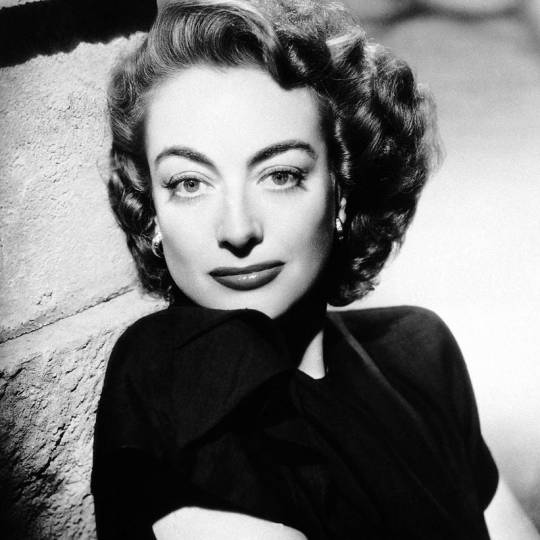
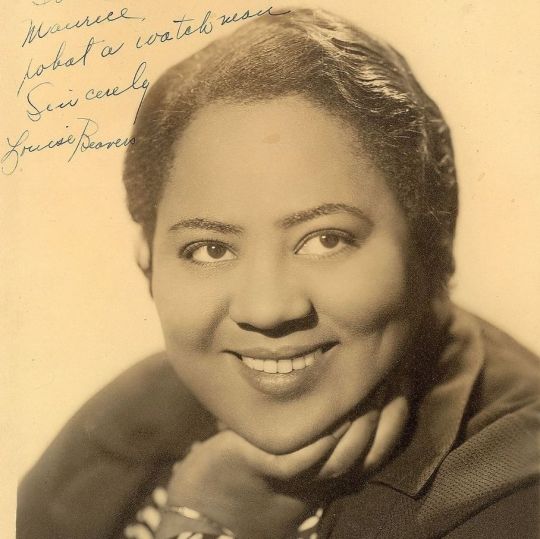
Propaganda
Joan Crawford (Dancing Lady, Mildred Pierce, The Women)— God, where do I start!!! Her face is so UNIQUE and compelling and stands out so much. I love her thick brows and high cheekbones. She has a school-marmy hardness too her that makes her a little scary and therefore sexy. Her low thick voice also does it for me. Despite being an unusual looking woman with an unusual face, she never loses her glamour. Just a gorgeous talented actress, AND she was some sort of gay!!!
Louise Beavers (Imitation of Life)—louise beavers spent her whole life forced to play maids and housekeeper characters so as VENGEANCE, i am bringing forth every elegant picture of her i could find to demand justice! black vintage beauty! [pics below the cut]
This is round 3 of the tournament. All other polls in this bracket can be found here. Please reblog with further support of your beloved hot sexy vintage woman.
[additional propaganda submitted under the cut.]
Louise Beavers:

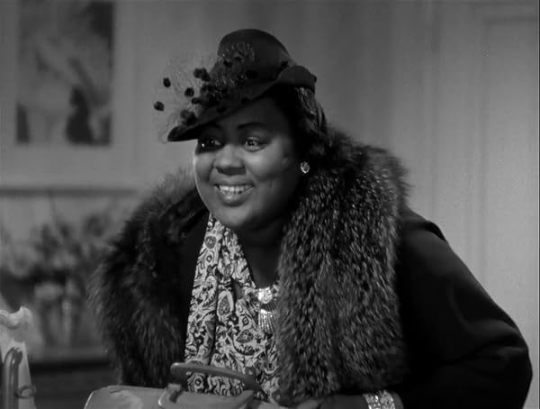

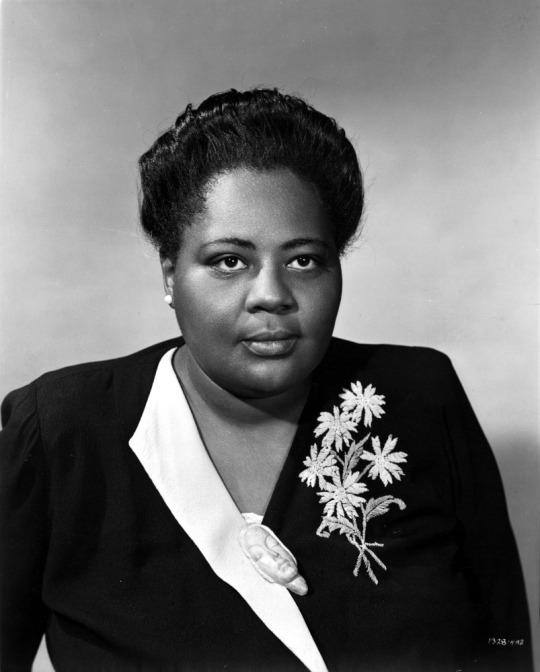
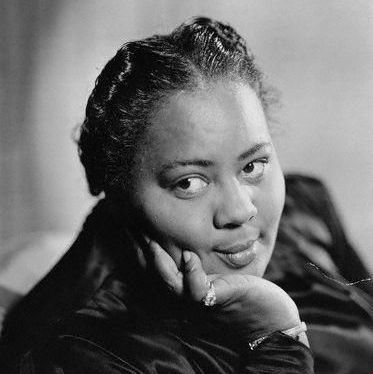
Joan Crawford:

I just love women that are very mean.

she was a smoke show in every decade, from the 20s to the 60s.

64.media.tumblr.com
The classic matronly beauty with amazing eyebrows

of course there's a space for MILF joan but i want to just take a second and say she was so cute in her early movies (like grand hotel and the women)! those parts often get forgotten but her stardom shines in them just as much as in her older #queen #icon roles
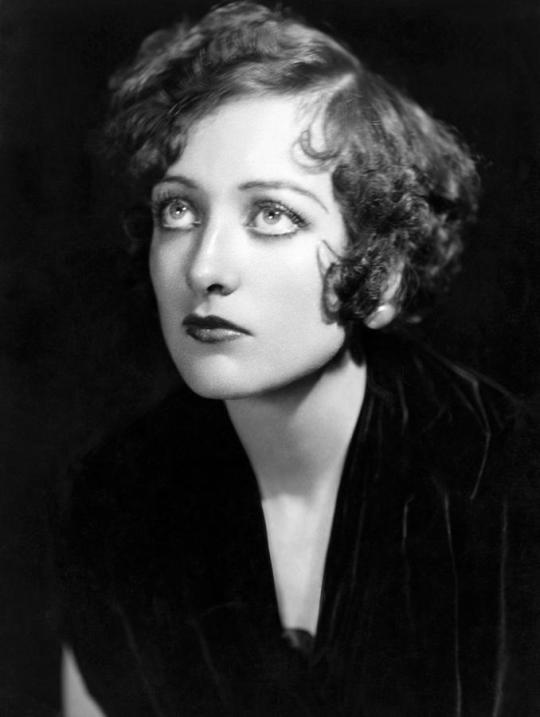
Misremembered for wire hanger hatred, this original screen queen mastered the art of the comeback and refused to let Hollywood toss her aside as she aged. The term “auteur” is usually revered for directors or writer-directors, but most critics have one actor they’ll give that title to as well: Crawford—anyone who knows classic movies already has a “Crawford picture” in their head. She knew how to style herself and promote herself. She made herself a star and kept herself fixated in the Hollywood firmament. What’s hotter than knowing just how hot you are?
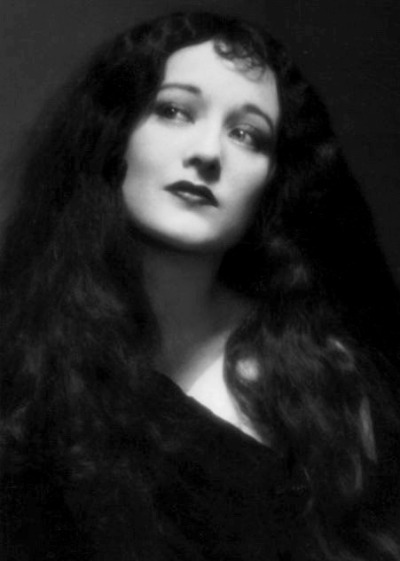

(don’t think about Mommie Dearest right now) Joan was known for being super nice to all the like crew of the movies she worked on and she’d get everyone gifts. Joan would hold movie nights at her house and knit at the back of her home theater. Joan was sooo obsessed with other women including Greta Garbo, whos dressing room she would obsessively and purposefully walk by. She said that while working on Grand Hotel, Garbo grabbed her face and “if there ever was a time in my life where I would’ve been a lesbian, that was it.” But like Joan also probably did sleep with women including Barbara Stanwyck. Joan was so obsessed with Bette Davis, screening multiple movies of hers in a day at her watch party, constantly trying to spend time with her or do a movie together, insisting on the dressing room next to hers at Warners and sending her daily gifts… etc. Once Bette said that sex was gods joke to humanity and Joan said “I think the joke is on her.” Joan fucked a lot. Joan got caught publicly fucking a man and sent a letter to the woman who saw them basically saying “I bet it excited you” and the woman was like you know what. It did. Joan was best friends with a gay man. Joan was an actually genuinely good actress even though people mocked her a lot for being like cheap and stupid (partially because she never finished school because her family was broke). Joan was so insane and so cool that’s all.

91 notes
·
View notes
Note
Hi! This request was easier to search for, so I see you’ve recommended Hearts of Wulin and Ten Thousand Days for the Sword. Do you have any other wuxia or xianxia game recs?
Have a good day!
THEME: Wuxia Games.
Hello friend, I'm certainly not an expert, but after reaching out to some more knowledgeable folks, I think I have a few!
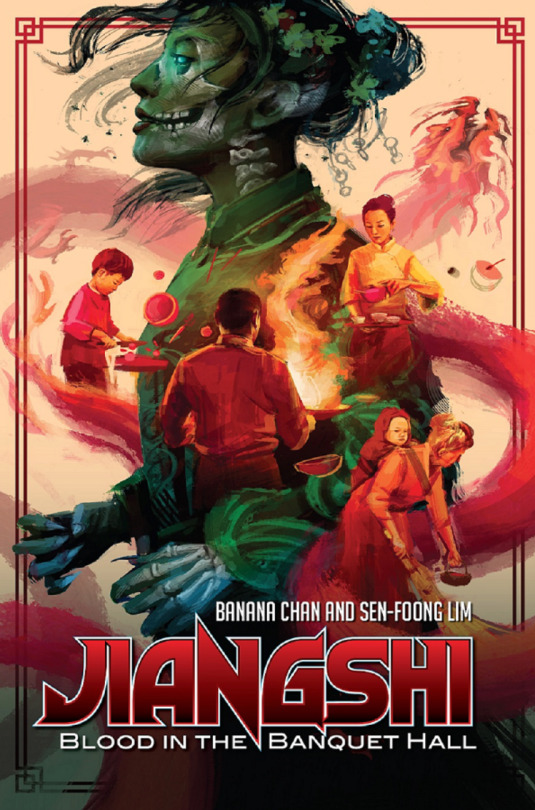
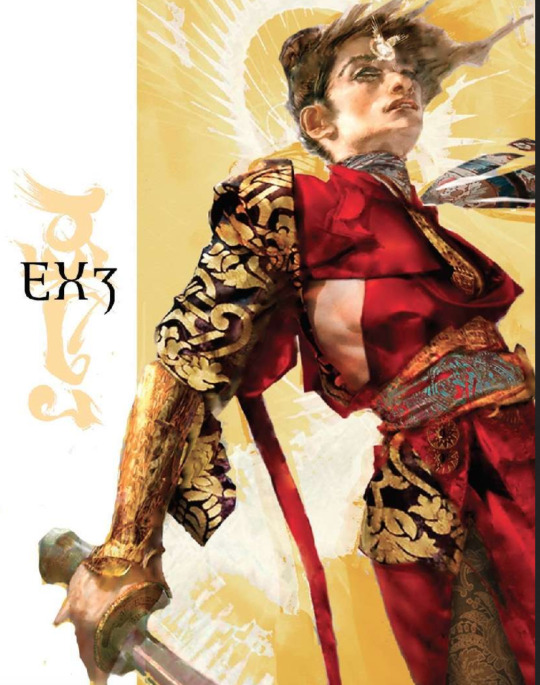
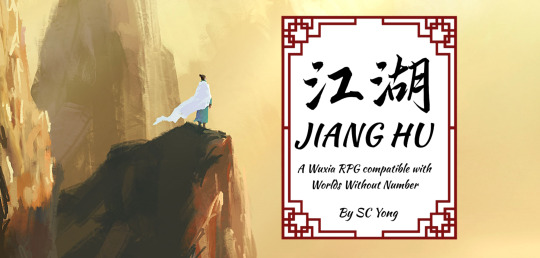


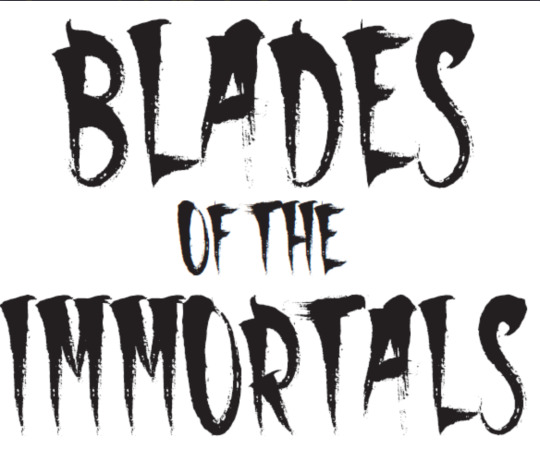
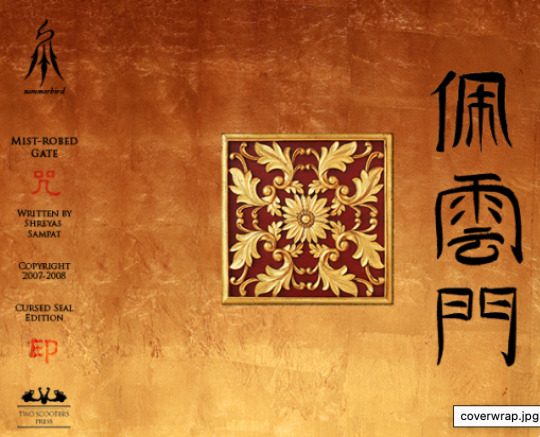
Jiangshi: Blood in the Banquet Hall, by Wet Ink Games.
This is a collaborative, storytelling RPG about a Chinese family making their living by running a restaurant in one of America’s Chinatowns, circa 1920. Despite societal backlash and anti-Chinese laws, they have turned a profit and their quality of life has recently improved.
Night, however, brings a new terror.
Players take on the roles of members of the Chinese family (mostly from Guangdong province), spanning three generations, who face threats of jiangshi (hopping vampires) at night and racism by day. It has players balancing the responsibility of maintaining their family business with protecting themselves and their community from the dreaded Jiangshi. This is primarily a game about storytelling. Combat is limited, but horror, drama and sometimes comedy are the primary vehicles for driving the game forward.
This game draws quite a bit from boardgaming elements, so I think this one is best played around a physical table, especially since it requires a custom deck of cards. You’ll use these cards to represent the demands of running a restaurant in the day, as well as fighting of a vampire at night. This game is probably on the borders of what I think is considered wuxia, but if you have a horror lover in your group, this might be worth checking out.
Exalted, by Onyx Path Games.
This is the tale of a forgotten age before the seas were bent, when the world was flat and floated atop a sea of chaos. This is the tale of a decadent empire raised up on the bones of the fallen Golden Age, whose splendor it faintly echoed but could not match. This is a tale of primal frontiers, of the restless dead, of jeweled cities ruled openly by spirits in defiance of Heaven’s law. This is a tale of glorious heroes blessed by the gods, and of their passions and the wars they waged in the final era of legends.
Exalted has a number of different sources, only one of which feels close to wuxia, but the stories are certainly expected to give you long, sweeping epics and larger-than-life characters. There are many different kinds of Exalted, including Solars, Lunars, and Dragon-Blooded. Since I’m not a wuxia connoisseur myself, I’m not entirely sure how close Exalted comes to hitting the mark - I’m mostly recommending it because it came up connected to some other wuxia fantasy games when I was doing some searching.
Jiang Hu, by wum1ng.
Jiang Hu is a role-playing game for the wuxia genre. Drawing inspiration from wuxia novels written by luminaries such as Jin Yong and Gu Long, the Feng Yun comics from Ma Rong Chen and the multitude of wuxia movies and television series, this game brings the world of dashing swordsmen, warrior monks, brawling beggars and high-flying stunts to your tabletop.
Players take on the role of Martial Artists fighting against various threats to the lands of Jiang Hu, ranging from evil sect leaders who have mastered forbidden secret martial arts techniques to megalomaniacs seeking to take over the Imperial Throne by force and the blood of countless innocents.
The Worlds Without Number series by Kevin Crawford has its praises sung by many people, especially folks in the OSR scene, and that is the bones that this game is built on. Your character is built from quite a list of skills, which are differentiated between Combat and Non-Combat. You also have a number of secondary attributes, for things such as Armour Class, Evasion, and Luck, as well as a dedicated space on your character sheet for weapons and martial arts. Expect combat to to take up a bulk of your time!
When you roll for your character background, you also get a significant life event that is expected to shape your character’s past, such as having a loved one murdered, or falling into serious debt. Out of all of the games listed here, I think this game is the closest to D&D, what with the “packages” of skills, items and abilities attached to each background.
The Oath, by brushmen.
"We seek not to be born on the same day, but hope to die on the same day." And with such an oath, Yong, Li, and Ming swore loyalty to each other.
When earthly desires tempt them, and devotions threaten to tear them apart, with or without a hand from uncaring fate…
will their oath endure?
The Oath is a collaborative storytelling game for one Game Moderator and three players.
This is meant to be a one-shot, which borrows the Entanglements system from Hearts of Wulin and the character Keys and Tags from Lady Blackbird. Since this game comes with characters already pre-written, it would probably be very good for groups who have very little time, or who want an easy on-ramp to games or the wuxia genre. I like the fact that the Keys give you prompts and directions for your character’s behaviour; it’s strong statement on how the author interprets the genre, but it still gives you, the player, a choice on what elements of your character will be emphasized, and what elements will take up the background.
brushmen also has another wuxia Lady Blackbird hack called The Escort, about recovering from a violent robbery, this one for four players and one GM.
Four Swords, by ehronlime.
This is a tabletop roleplaying game about being young heroes in a wuxia story, made for the #AsianMartialArtsJam.
You start with your First Sword, which you use to challenge other heroes and villains and strive for mastery.
You will then gain three more Swords: the Second a sword of great pride and regret, the Third a sword of mastery and expression, and the Fourth a sword which is no sword.
You will also struggle between the obligations put upon your by others and what you truly desire from the life of a wandering hero.
Four Swords really zeroes in on the combat mastery part of wuxia fantasy. Your characters will grow into mastery, and battle with rigid codes and rules that structure the world you live in. The game is very descriptive, leaving you with only 4 abilities that are meant to broadly encompass what you are able to do. The game encourages characters to interfere with each-other using a mechanic called Vows, and levelling up gives you access to different techniques, which reinforce the competence of your characters as well as the rigid guidelines by which they might improve.
This game was made for the Asian Martial Arts by Asian Creators Game Jam, so you might find some more wuxi-themed games there!
Blades of the Immortals, by Jagganoth.
Blades of the Immortals is a tabletop roleplaying game inspired by xiānxiá. It uses the Forged in the Dark rules engine developed by John Harper, as seen in games like Blades in the Dark and Beam Saber.
In Blades of the Immortals, you will take on the roles of cultivators, striving for your own ambitions, for the glory of your sect, and for the ultimate prize — immortality. You'll viciously struggle for scarce resources, compete for the patronage of powerful and influential teachers, gather allies to your banner, and scheme against your enemies. Your cultivators will wield mystical treasures and supernatural spell-arts, mastering the very laws of the cosmos as their weapons, as they become entangled in centuries-long vendettas between deathless wizard-kings.
This game is solidly focused on supernatural abilities and grand increases in strength. You choose from one of 9 different playbooks, and collaboratively create a faction that binds you all together. The sources listed as inspirations for this game include (but are not limited to) Grandmaster of Demonic Cultivation, Forge of Destiny, Aspiring to the Immortal Path, and Journey to the West.
Compared to other Blades hacks, this game reduces the standard number of action ratings, ties character growth to a change in your character’s beliefs, and separates your gear from your playbook. Characters can also level up through Realms, which increases your effectiveness and upgrades your inventory.
Mist-Robed Gate, by Shreyas & Elizabeth Sampat.
There are some things that we value more than life.
There are things we're willing to scheme and cry and fight and die for.
That's what wuxia cinema is about— fighting and dying for the things we care about. That's what Mist-Robed Gate is about.
Mist-Robed Gate comes with a full list of movie recommendations, but includes Crouching Tiger, Hidden Dragon and House of Flying Daggers as key influences. I really like the fact that a key mechanic of this game includes stabbing your character sheet with a knife.
Players create factions first, and then take turns creating characters that represent those factions, with elements that represent the hero’s distinctive personality and style. Players also create the different locations that will serve as the stage for your scenes. Play happens over a series of scenes, as their characters push and pull against each-other, sometimes even making terrible demands (which is where the Knife comes in). If you want a game that has a lot of politics in the terms of actions having large ramifications over big groups of people, and if you want a game that is extremely dramatic, you might want to check out Mist-Robed Gate.
47 notes
·
View notes
Text
Tom Bosley before Happy Days (2 of 2) (1959-1972)
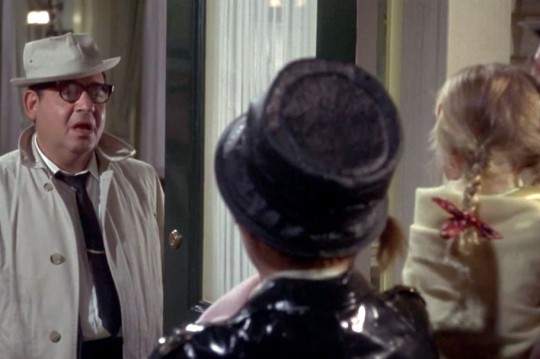
Tom Bosley's next movie in 1968 was as a family doctor in Yours, Mine and Ours starring Lucille Ball and Henry Fonda.
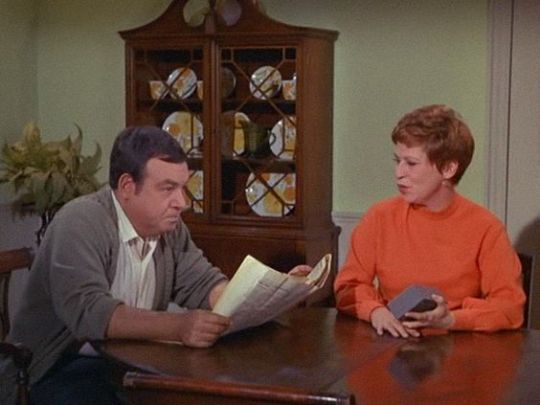
In Dec. 1968 Tom Bosley teamed up with Alice Ghostley as KAOS agents in an episode of Get Smart.
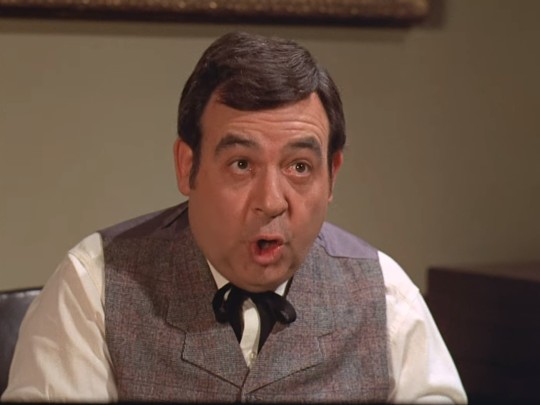
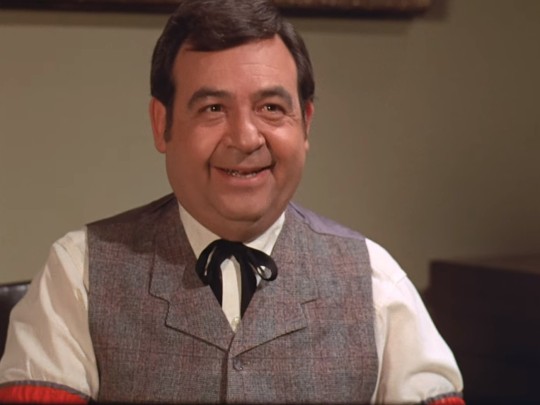
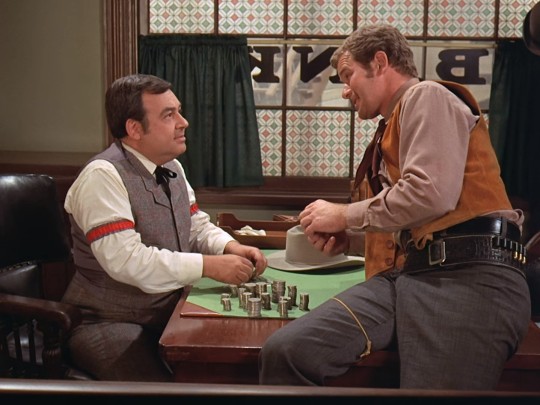
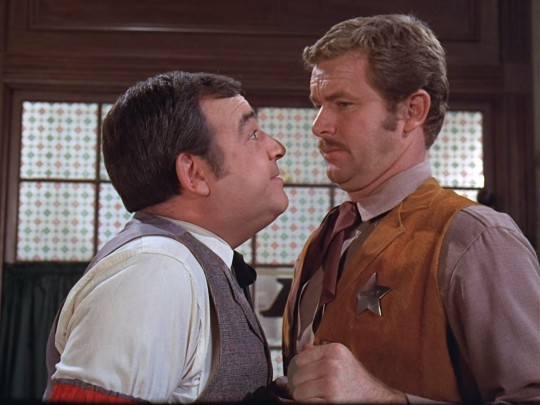
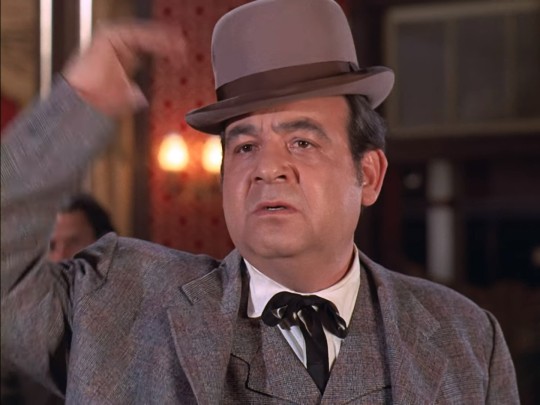
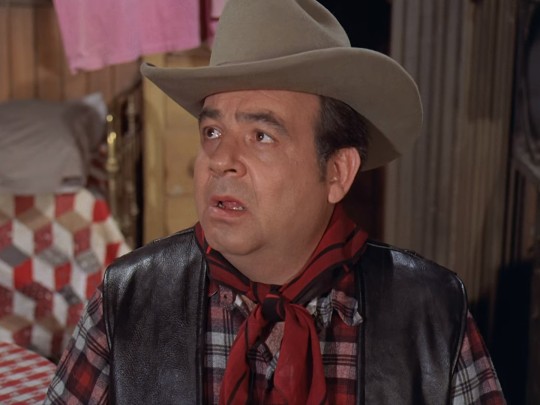
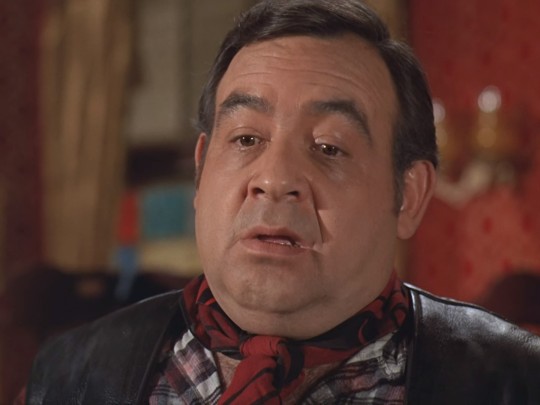
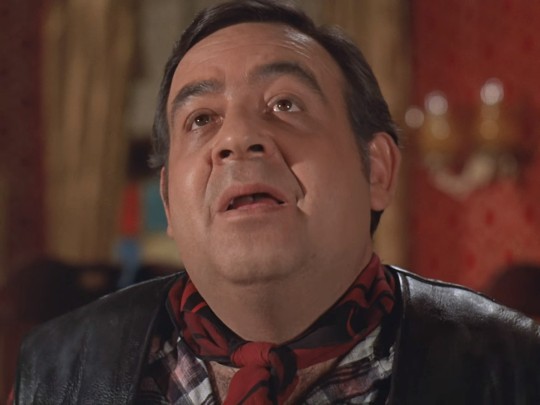
Tom Bosley guest-starred in an episode of The Virginian in 1969.
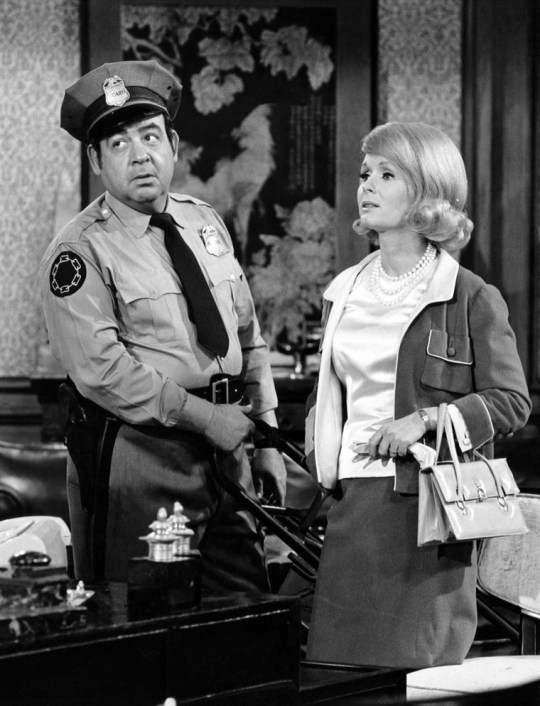
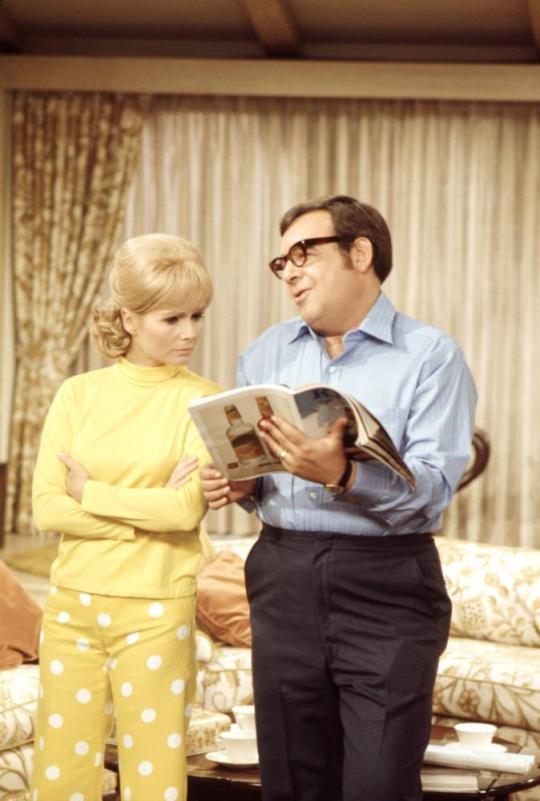
In 1969 Tom Bosley started as a regular on The Debbie Reynolds Show. He played her brother-in-law in 20 of the 26 episodes of the one season it was on.
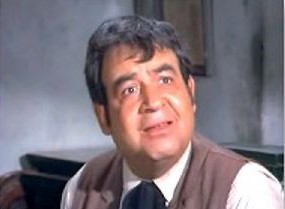

Tom Bosley also guest-starred in 2 episodes of Bonanza, 1 in 1968 and 1 in 1969. He is shown here with, of course, Dan Blocker.
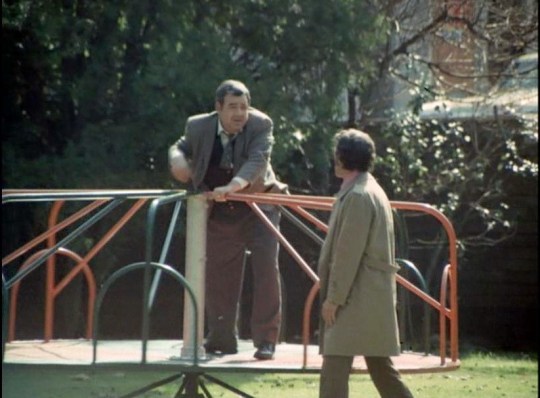
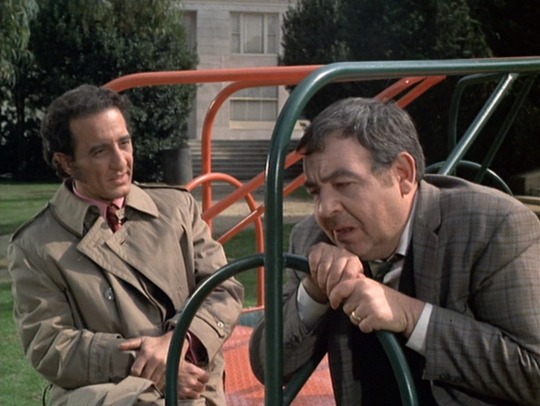
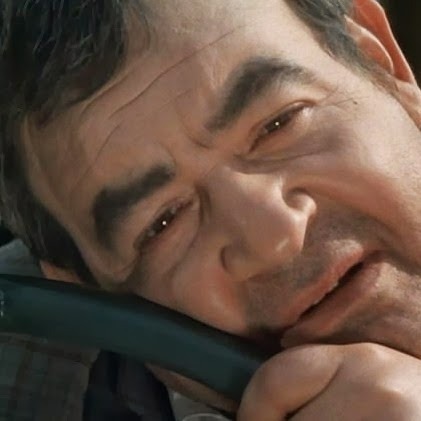
Tom Bosley was in the pilot episode of Night Gallery which aired in Nov. 1969. He was in the segment entitled 'Eyes' which is one of the more memorable offerings of the Night Gallery series. It starred Joan Crawford, screenplay by Rod Serling himself and directed by a young Steven Spielberg.
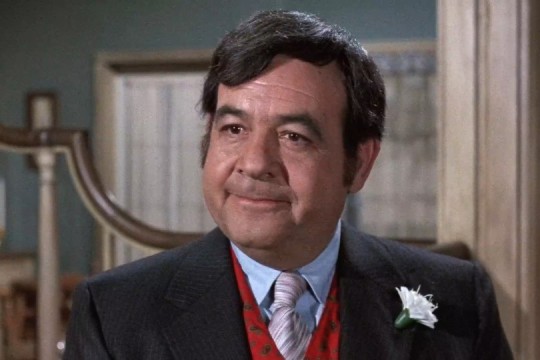
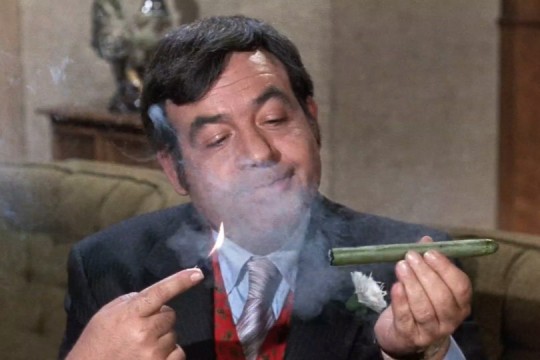
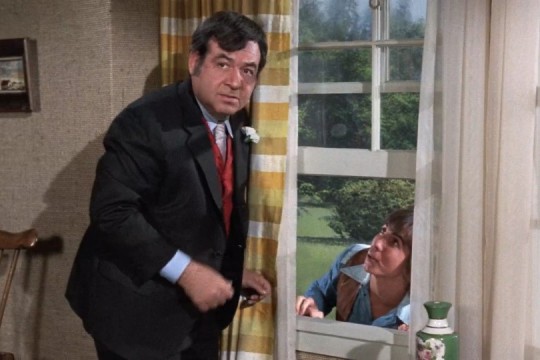
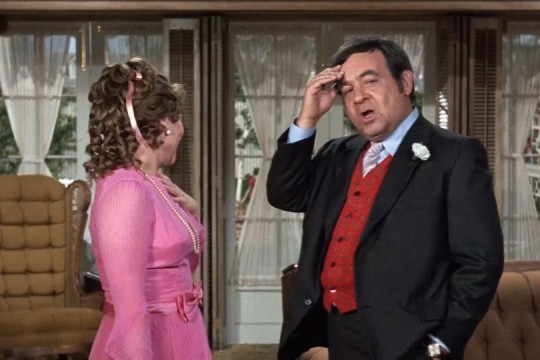
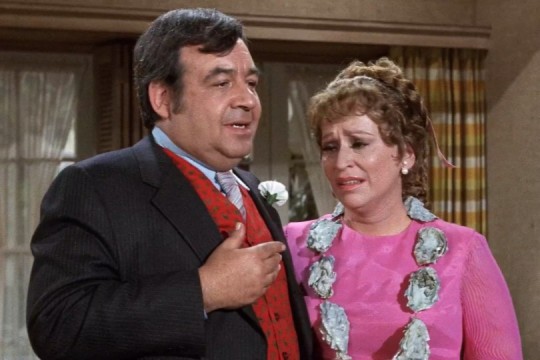
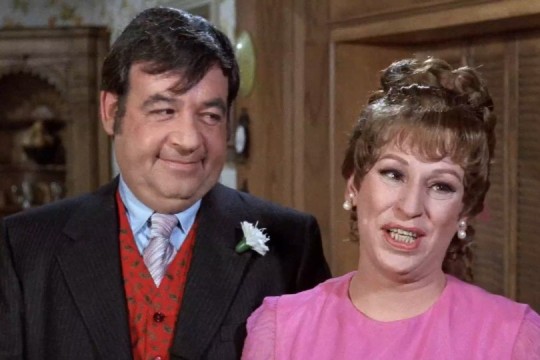
Tom Bosley played Esmeralda's old boyfriend in an episode of Bewitched in 1971, again teaming up with Alice Ghostley.
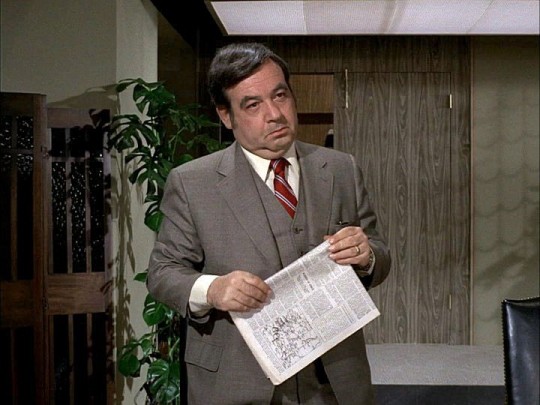

Also in 1971, Tom Bosley appeared in an episode of Mission: Impossible. Pictured with Harold J. Stone.
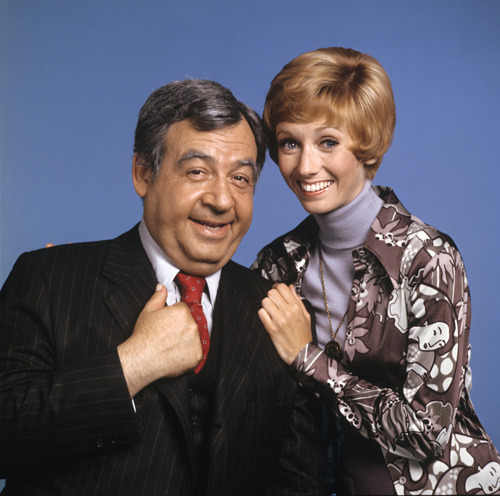
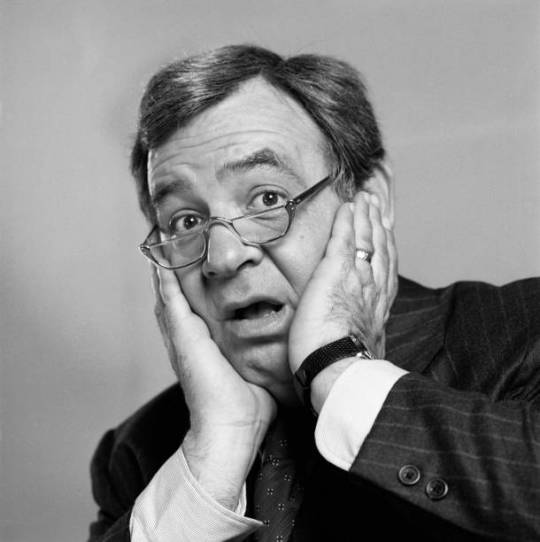
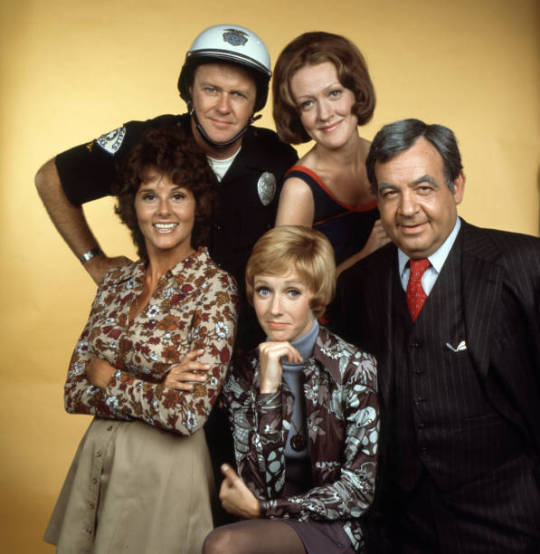
In the fall of 1972 Tom Bosley was cast in The Sandy Duncan Show. This was a reformulation of the show Funny Face from the previous year. The only thing that remained from Funny Face was Sandy Duncan's character. The new cast also included M. Emmet Walsh. Bosley played Sandy's boss at an Advertising Company. The show lasted 13 episodes, which is how many episodes Funny Face lasted.
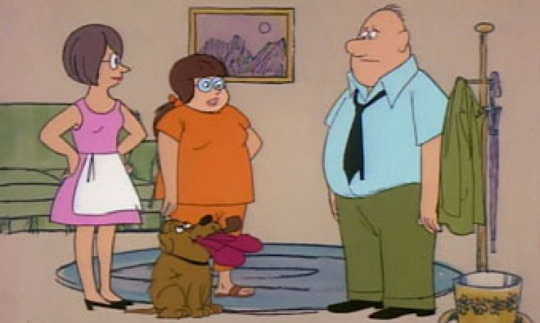
Also in the fall of 1972 Tom Bosley started in the animated Wait Til Your Father Gets Home voicing the father Harry Boyle. This show lasted 3 seasons and 48 episodes.
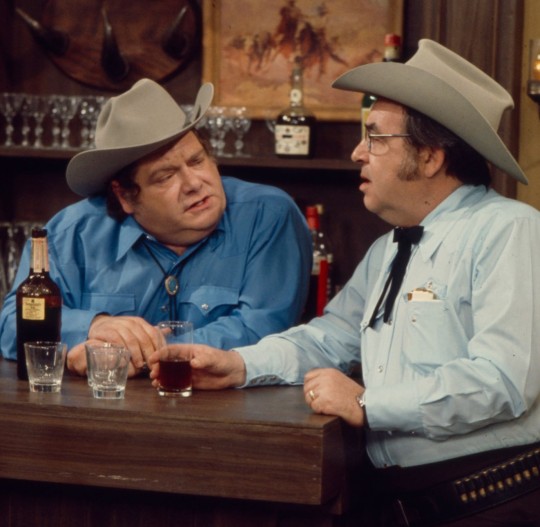
In 1973, Tom Bosley guest-starred in an episode of another 13-episode seres, A Touch of Grace starring Shirley Booth. Pictured here with comic Jackie Vernon.
During these years Tom Bosley also guest-starred in episodes Mod Squad, The Sixth Sense, Marcus Welby, MD, Medical Center, Love, American Style, Maude, McMillan & Wife and others. He also did many TV movies and was a regular on The Dean Martin Show.
46 notes
·
View notes
Text
Why We Love the Boys
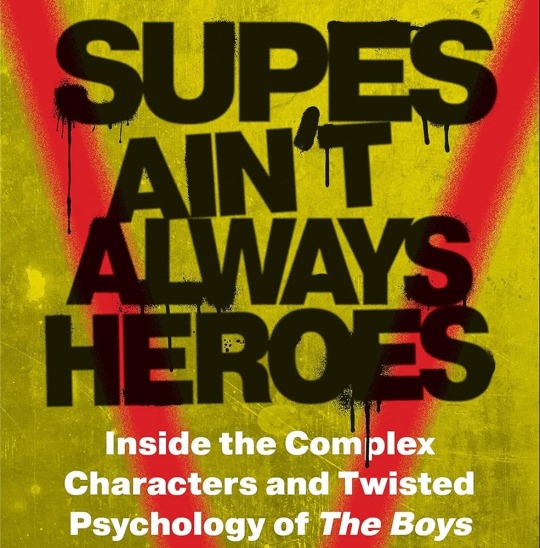
As promised, here is my review of Supes Ain’t Always Heroes. I actually used to write book reviews in my high school journalism days, so here we go!
What this book is: A masterful deep dive. A study on character psychology, the source of the comic and show’s inspiration, and the narrative themes illustrated in The Boys that parallel American culture and our real lives.
It includes interviews from one of the comic’s creators, Darick Robertson, The Krip himself (Eric Kripke), and actors Jim Beaver (Robert Singer), Aya Cash (Stormfront), Chace Crawford (The Deep), Jessie T. Usher (A-Train), Nathan Mitchell (Black Noir), and of course, Jensen Ackles (Soldier Boy).
It also includes a small but significant ode to the creativity of fans and fandom (with a mention of fanfic writers)!
I’ll admit, I felt seen. 😊
Who wrote it: Psychologists Lynn S. Zubernis and Matthew Snyder. Zubernis is a self-proclaimed fangirl of not only this show, but Supernatural and Eric Kripke in general. (That aspect definitely comes through in her writing.)
She is also editor of Family Don’t End with Blood: Cast and Fans on How Supernatural Changes Lives and There’ll Be Peace When you Are Done: Actors and Fans Celebrate the Legacy of Supernatural. Both of which I now want to read.
Several other authors also contributed to this book, as their expertise and backgrounds lend to the subjects they’re covering, such as racism, sexism, the entertainment industry, the comic’s inception, and more.
Who wants to read this book: Anyone who enjoys learning about what makes characters tick. What drives their choices, their sense of morality and justice, and their trauma and strife that lead them to do heinous things. This book will help you better understand your favorite characters (and how to write about them).
Perhaps most importantly, this book is for anyone who wants to read it put into words, why many of us love The Boys, as well as Supernatural.
In a way, the latter is more escapism entertainment than The Boys. Because in this show, there isn’t much, if any escape.
Despite this being a “superhero show,” as we all know, it’s so much more than that. It’s a mirror held directly into our own faces: about why we enjoy heroes and antiheroes, and excuse the “bad behavior” of the ones we like.
About mental health, grief and loss, nature and nurture, coping mechanisms and the importance of choice in dealing with trauma; of racism, sexism, misogyny, weaponized social media, politics, corporate greed, and the power (and cruelty) of good marketing.
This book explores the true villain of the story (and it ain’t Homelander).
I’m going to get into my favorite aspects of this book—as well as an amazing chapter on Soldier Boy’s character study (and why we love him, perhaps too much).
Though in my opinion, it was missing one small, but key thing…

The Mirror of The Boys on Screen
This world is a gritty, bloody, and at times all-too realistic take on how superheroes would be if they lived in our world.
They are the worst of celebrities, professional athletes, and politicians all rolled into one. They are the shiny products of a company and are marketed as such. And they often buy into their own hype.
Some of my favorite quotes on this topic:
“The Boys often reflects darkness in our real world that is uncomfortable to watch. While we go through the tedium of our daily lives, trying to get by and using television or comics as an escape, it can feel difficult and overwhelming to confront the very real and insidious sources of authoritarianism, nationalism, and corporatism that are not just part of a story.
“This show holds up a mirror and forces us to catch a glimpse of things we need to question, and asks us why we so easily believe the talking points of systems with marketing departments and press flacks behind them that carefully massage every word in order to get us to feel enamored with their product or policy.” (p. 227-228)
“The Boys works to reveal the nonaltruistic, sociopathic nature of contemporary US corporate culture. In a sense, The Boys uses the behavior of its characters to diagnose not an individual, but a culture.” (255)
In studying narrative I’ve learned that the best fiction and art serve to reflect the human experience. In this case, it’s something The Boys does expertly, even though it’s packaged in extreme, shocking, and often uncomfortable ways. But also in brutal, hilarious satire that’s fun to watch.
It “exposes real-world abuses, revealing many” of our own frustrations in American culture and in life in general (267).

Major Themes & Questions Explored
Several Boys themes are explored from a psychological, cultural, and narrative point of view, as I mentioned earlier. These are some of my favorite segments:
Toxic Masculinity & Narcissism
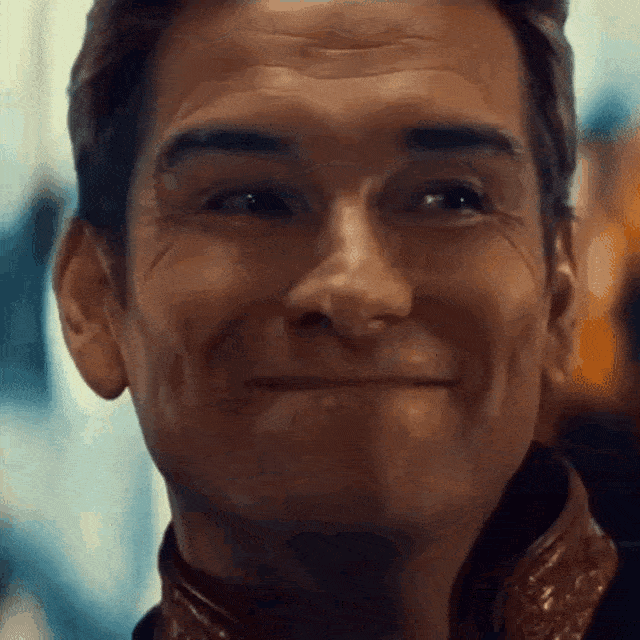
A whopper in The Boys, and the main theme of season 3. This book defines clearly what both of these words actually mean from a psychological point of view.
It also takes the bad taste out of your mouth that you might get from just hearing the words “toxic masculinity,” as it’s a phrase that can be carelessly thrown around to describe men and character traits that aren’t truly toxic.
How being emotionally available to your loved ones and not repressive of your feelings doesn’t make you weak, or less of a man. And how “being strong” doesn’t mean being physically violent and domineering. (AKA: the Big Swinging Dick™️ in the room.)
Narcissism is explored in a very interesting way. The book gives a diagram of different aspects of narcissists and how each character (Soldier Boy, Homelander, Butcher, and the Deep) falls into them.
Soldier Boy, for example, is classified as a “Classic Narcissist,” while Homelander a “Malignant Narcissist.” <- This will play into SB’s character study, and the main difference between SB and Homelander.
Butcher, however, displays narcissistic tendencies but is not, in fact, a narcissist. (More of an antisocial sociopath. Yay for him.)
Misogyny & Sexism

The classic superhero world of comics dates back to the 1930s and ‘40s. It has been, and in many respects still is a (White) male-dominated industry, where in narrative, female superheroes typically work under a male leading the team, as in Justice League, Teen Titans, and the Avengers.
As much as I love DC and Marvel comics, female characters have also been drawn wildly sexual for male readers and the male gaze, and non-supe characters have been written primarily as love interests and damsels for the hero to save. (Think Lois Lane, Lana Lang, and Mary Jane.)
Modern adaptions have given female characters more agency, but their foundations were rooted in underlying sexism and the mythic hero—an Odysseus-type with certain characteristics of male strength and heroism. And that goes all the way back to classic literature, like The Odyssey, Beowulf, and the Epic of Gilgamesh.
In The Boys, the female supes go through the same issues as their comic counterparts. And they are treated how women are treated in the real world—marketable as sexual objects. (Starlight’s forced costume change is a prime example.)
Author Danielle Turchiano argues in the book that the women in power at Vought (Madelyn Stillwell, later Ashley) are given only so much power as men like Stan Edgar and Homelander give to them.
Stillwell, Ashley, and even Stormfront “drink the Kool Aid” of the misogynistic infrastructure of Vought, but they’re not truly “powerful” in and of themselves. (112)
And I would add that the only female characters that have or find true agency are Grace Mallory, Annie January/Starlight, and Maggie Shaw/Queen Maeve. Even Victoria Neuman is trying to work the political schematic and Vought by operating “within the system” Vought has created.
Mental Health, Trauma & Unhealthy Coping Mechanisms
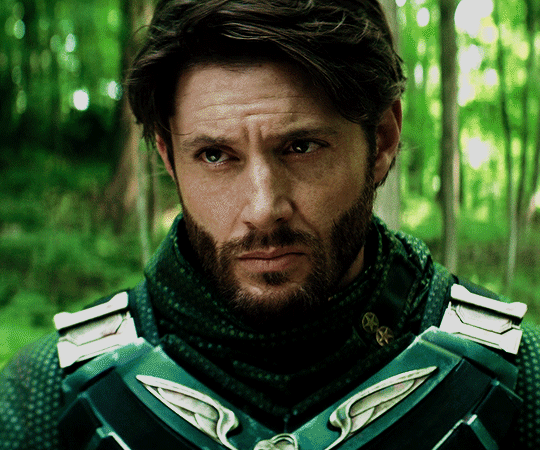
This is a huge section, and rightly so. It kind of spans throughout the book, really, because all of these characters have traumas that inform who they are as adults making the (often grotesque) choices they make.
For many of these characters, it stems from their upbringing and fraught relationships with their parents, whether explicitly or implicitly explored in the show.
Butcher: Is an antisocial sociopath with narcissistic tendencies. Arrogant, emotionally manipulative, violent, and obsessive. He was also physically and emotionally abused by his father, led to use drinking and violence as a means to cope and express himself. His rage is so deep under his skin—he loathes himself for it (and his father), but struggles immensely to escape it.
Homelander: A malignant narcissist, the height of arrogance, and emotionally manipulative. He lacks empathy for others' pain, and in fact enjoys inflicting it. Yet he was a sensitive, gentle child who only wanted connection and love. Vogelbaum raised him like a lab rat and fostered him in a cold, detached cell. He was raised to be entitled and to believe he was an all-powerful god, the lord of his own kingdom within his mind, excused from the responsibility of his actions.
Soldier Boy: Also a narcissist; violent, arrogant, misogynistic, and often indifferent to the damage he causes, emotional or physical. Yet he was also emotionally abused by his father, who set impossible standards for what it meant to be a man. It drives Ben to try and prove his worth to his father, though he’s never able to. It fosters the lack of self-worth he feels as he seeks validation through fame and what he believes power to be.
These three characters have many similarities, but also notable differences that set them apart from one another. And both Butcher and Soldier Boy use substances like drugs and alcohol to cope with their traumas—ones that their forced stoicism and sense of manhood won’t allow them to easily express.
“We see Soldier Boy use substances almost continuously in season three to deal with his PTSD from the childhood emotional abuse he received from his father, the betrayal and assault from his team, and the torture he endured from the Russian scientists.
“In the short term, the use of drugs and alcohol to avoid thoughts and feelings about traumatic experiences can be felt as helpful, but in the long term, it hinders one’s ability to process emotions and can cause a deeper depression from the guilt and shame of both avoidance and substance abuse.” (27)
Heroes, Antiheroes & Villains

This book explores two key questions that the show encourages you to think about:
Who the hell is the hero of this story?
And who is the villain?
The surface-level answer is that Homelander and other supes like him are the villains, and Butcher and his band of bros are the heroes (or antiheroes). But they commit just as questionable, sketchy, and downright murderous acts as the supes they’re trying to take down.
“Butcher is not really a good guy. He’s manipulative and self-centered. His reasons for wanting to take down Homelander are utterly personal. That it serves the greater good is almost a coincidence.” (9)
And if Butcher is not a hero, but a vengeful vigilante, then why do we root for him so much?
Well, we see his incredible flaws. But I sympathize with his struggle in losing his wife and the life he could've continued to have with her. I root for the underdog going against the hydra head of Vought and the psychopathic Homelander.
And I see in Butcher, as I also do with Homelander and Soldier Boy, their traumas and their internal conflicts, their deep-rooted self-loathing, and a desire, deep, deep down…to be loved.
(And to foster connection with others, even if they’re unable to sustain them.)
On the flipside, we have antagonists in this show who do truly heinous things. What makes them compelling and even sympathetic, yet again, are their painful upbringings that have shaped them to be who they are. The supes of this show are byproducts of being treated like products.
Like the saying goes: Villains aren’t born, they’re made.
That’s why the real villain of this story is Vought International. It’s an allegory, and an indictment of the ruthless corporate greed that pervades American culture—and much of the world.
It’s why Stan Edgar is sometimes scarier to me than even Homelander (and was the true villain of my story, Break Me Down), if far more insidious.
Speaking of BMD, let’s get to it, shall we?
Here’s a (lot) bit about the Soldier Boy section of the book.

Soldier Boy: Why We Can’t Hate Him
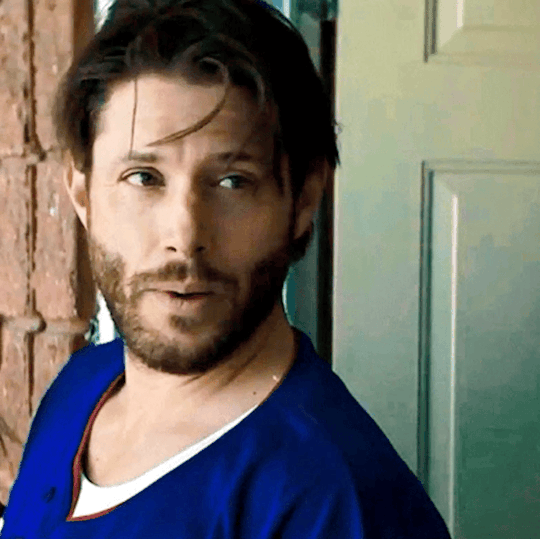
I had to laugh out loud at the title of Soldier Boy’s chapter:
Loving the Villain: The Confusing Case of Soldier Boy
I’m not gonna lie. I felt called out. 😂
It is a confusing dichotomy. Soldier Boy is an absolute asshole. Misogynistic, narcissistic, arrogant, callous, violent…
But also deeply traumatized, a man-out-of-time, emotionally abused, byproduct of the historically and culturally different time he was raised in, a man who just doesn’t get it…
And also charming, adorably grumpy, and undoubtedly attractive.

It’s hard to indict “Ben” as an unredeemable villain in the same way I do Homelander, the psychologist-labelled Malignant Narcissist.
Therein lies the main difference between Soldier Boy and Homelander: Soldier Boy doesn’t take joy in harming others the way Homelander does. But he still harms people, whether he means to or not.
Zubernis confirms many of my own conclusions and ideas about Soldier Boy, and why I still rooted for him to be better, and didn’t want him to die at the end of season 3.
As Zubernis rightly exclaimed during her own watch of the finale: “Noooo, don’t kill the Danger Grandpa Baby Murder Kitten!” (175)
Because Jensen did what he does best in his roles: He made us feel Ben’s pain.
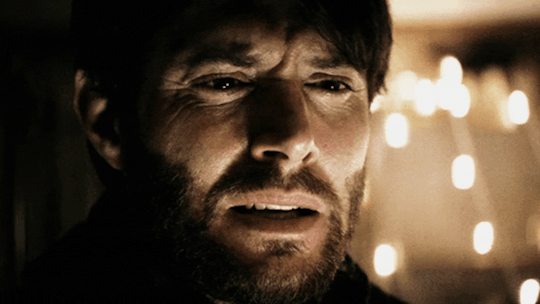
“What’s funny is, in regard to Jensen playing Soldier Boy, you know he’s fucking fantastic, he’s just so good at bringing the audience, and it’s almost like—what I laugh about is, he was probably a little too good at his job!” Kripke said. (180)
And he continues, “In part it’s because of the fandom. So many people took his side in the finale, they’re like, Were’s on his side, fuck everyone! And you’re like, but he’s the bad guy and he’s trying to kill a ten-year-old.”
Were there fans who held this viewpoint? I’m sure. There are some radicals who don’t give a fuck and will side with their favorite character, come whatever. But while I can’t speak for others, that’s not how I interpreted that moment in the season 3 finale.
Yes, I think Soldier Boy was (wrongfully) willing to fight Ryan. Do I think he would’ve killed him? I’m not sure. I think he would’ve done what he had to do to get Ryan out of his way in his fight with Homelander. Maybe he would’ve been more violent than he intended, in the callous collateral damage he’d shown throughout the season, or maybe he would’ve gone that far, if provoked.
It’s a tough call, as I think this character can go one way or the other in terms of his “villain” nature. We just haven’t seen enough of him in the series yet for me to make that conclusion on the canon-version of Soldier Boy. (In fanfic, I’ve explored my own interpretation.)
But overall, I think The Krip once again underestimated the power of Jensen’s acting.
…And the ardent nature of his mostly female fanbase. 😂
Why We Love Soldier Boy
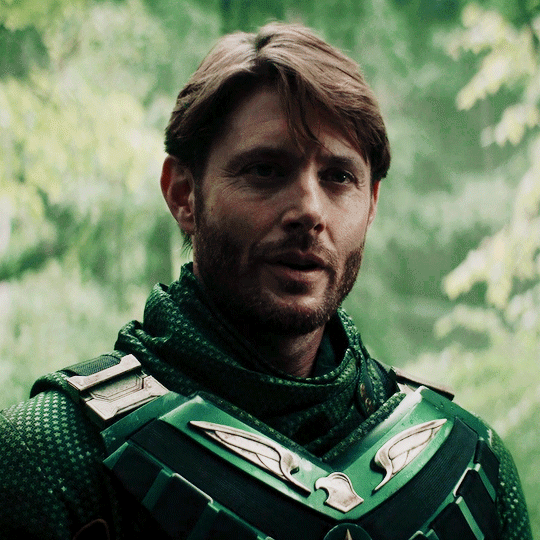
The author cites multiple reasons for why we love Ben more than we probably should:
It’s Jensen Ackles. Fair enough. His talent speaks for itself.
Soldier Boy’s backstory: He was emotionally abused by his father and as a result, he has a complex regarding his self-worth, “something to prove,” and a secret need for attention, validation, and praise.
He has trauma and PTSD: He is displaced from what is familiar to him and confused when the boys find him, and that is the least of it. He’s been tortured for 40 years. Can you even conceive of that?
He’s charming: in a sexy grandpa, adorably grumpy, lovable asshole kind of way.
We’re drawn to danger: dangerous “edgy” types are fun, especially when you’re physically attracted to the character.
He has his moments of vulnerability: Jensen’s ability to play the nuance in the character is the ultimate draw. I felt his pain, could see his torture, and his resulting PTSD. He longs for a family, even if his ability to bring up those children is questionable at best. 😅
But I think the one aspect the author doesn’t consider is the character’s capacity for change.
Soldier Boy’s Potential
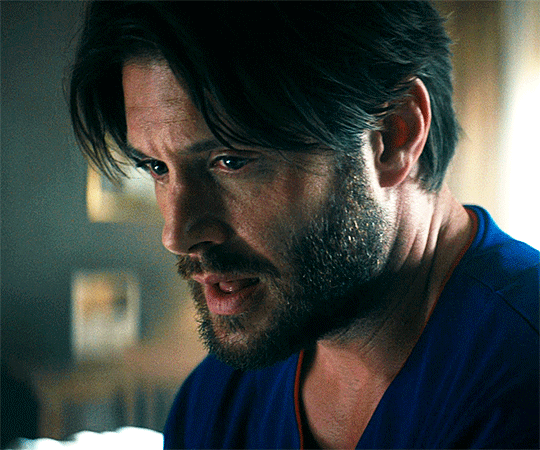
Again, I don’t think you can write off Soldier Boy’s potential for positive character development the same way you can Homelander, or even Butcher.
For one thing, we just haven’t spent enough time with the character. A lot of his collateral damage after he escapes imprisonment has been accidental, or PTSD-induced. Though we can’t discount how he murdered M.M.’s grandfather via collateral damage (and was callous about it).
I think this is what drew me to write about Soldier Boy. “For all his arrogance, his chauvinism, his massive ego and general bastardry, there’s still humanity in Ben.”
In the book, Nathan Mitchell also says something amazing about his own character (Black Noir) that resonated with me about Soldier Boy as well:
"One of the ingredients of a compelling character is contradiction. How does one aspect of our personality contradict with one another? [...] Who is he underneath? How might his true nature contrast with the demands of his job?"
Or coded for Soldier Boy/Ben: The pressures he puts on himself to be the type of man he thought his father wanted him to be.
Again, his sexist, misogynistic ideals are shaped by the time he was raised in, by being a product of Vought, and of his father’s emotionally abusive upbringing. Does this excuse or justify all of his behavior? Of course not.
But I think those 40 years in captivity changed him from the careless alpha dog we saw in 1984 Nicaragua…
He admits to Crimson Countess, with tears in his eyes, that he’d loved her. That he waited for her and his team—arguably the only social system he has in his life—to save him. He’s gutted to realize that not only did she and the rest of the team never love him, they hated him. They traded him for nothing. Just to get him out of their lives.
For all he claims to be afraid of nothing, tough as shit, he is afraid when he goes to face Mindstorm. He knows what the supe is capable of, and he visibly takes a shaky breath and tries to steel himself.
For a moment, he drops the “Soldier Boy” persona that he wears like a fine tailored suit. And he tells Butcher that the backstory Vought created for him was a lie; he grew up a rich kid who got sent to boarding school, but flunked out, because "he was a fuck up." And his father couldn’t be bothered to discipline him, implying he didn’t care enough about his own son to even lay a hand on him.
He is reluctant to kill Homelander when he finds out he’s Ben’s son (sort of). He even claims that he would’ve been willing to share the spotlight “with his own son.” — Something I doubt even Homelander would do.
Ben even seems to be fighting tears when he levies the same vitriol at Homelander that his own father did at him:
Homelander: “Weak? I’m you.”
Soldier Boy: “I know. You’re a fucking disappointment.”
Let me be clear. I don’t think it’s up to someone to change him (like a love interest). I don’t subscribe to that thinking, that a woman can “change” a man.
For example: In season 2, Butcher tells Becca, “Who was I before you? Nothing.”
And yet, she tells him that he put her on an unrealistic and unsustainable pedestal, in which she felt like she wasn’t allowed to fully be herself, unable to keep him from flying off the handle in rage. That kind of relationship (where one is dependent on the other to “keep them in check”) doesn’t work as a lasting, satisfying redemption arc, and it doesn’t work in real life either.
I do think, however, that a person is capable of change if they’re broken down enough (pun intended), and if they themselves have a desire to change. Someone they encounter can inspire them to be better, like Butcher with Hughie. That person can help support the other.
At the end of the day, however, it’s Ben that has to want to change.
If he wants love and connection, he’ll have to somehow want it, and try (and sometimes fail) to get it, thereby giving him agency and a redemptive character arc.
Now, obviously, it’s up to The Krip where Ben goes from here. He seems to have a more indicting vision of the character than I do (at least, so far). But we’ll see! The fan demand to bring back the character has already had Kripke confirming that Soldier Boy will be back.
Maybe it will encourage him to give the character a more satisfying ending than Dean Winchester got in Supernatural. Though granted, that one wasn’t his doing, apparently he was in favor of the ending the writers came up with.
Comparing Dean & Ben
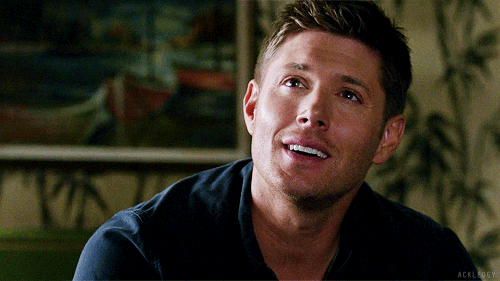
In his interview segment, Jensen talks about what, if any, are the comparisons between Dean Winchester and Soldier Boy. AKA: Wanting a father’s approval, and an undercurrent of “John Wayne”-esque masculinity in John Winchester that Dean sought to emulate.
Jensen also talks about where he drew from to not only embody the character of Soldier Boy, but bring nuance to him—and show the peeks of vulnerability under the bravado and stoicism.
“He’s so fragile and his ego is fragile. Just like Homelander. These bigger-than-life powerful heroes really have a glass jaw…
“And everyone walks on eggshells around him [Soldier Boy], and they tell him that they love him, and it’s the same with Homelander. Then when all of a sudden he faces his old team and Crimson Countess says we never loved you, we hated you—that’s a gut punch for him. Because even though on some level he may have known that, he never thought he would hear it.
“And he probably propped himself up around trying to believe otherwise, because how can you walk around knowing everyone you’ve ever cared about hates you? It’s too painful.” (191)
It really is. And I inherently felt this about Soldier Boy/Ben when I watched season 3 for the first time. That’s exactly what I got from his performance and thought, there’s more to this guy than the toxic masculinity he represents.
This guy just wants to be loved, like everyone else. He wants to feel important, and even after his father’s dead, “show him” that Ben is the man his father wanted him to be. And so, he bought into the illusion Vought painstakingly crafted for him.
Whether he can come back from that remains to be seen. But I choose to be optimistic until evidence points to the contrary. 😅 (We’ll see in season 4!)
So that’s my personal take on Soldier Boy and this awesome book. 💚 Thank you again @kaleldobrev for recommending it to me! I hope you all enjoyed my long-winded review and want to check this out.
And if you do read it, I hope to read your thoughts as well!

Tagging people who said they wanted to read my review on this book: @venus-haze @jessjad @kristophalis @sl33pylilbunny

#supes ain't always heroes#book review#why we love the boys#the boys#my take on Soldier Boy#boys psychology#character study#cast interviews#jensen ackles#soldier boy#Homelander#billy butcher#aya cash#stormfront#jim beaver#robert singer#nathan mitchell#black noir#chance crawford#jessie t. usher#the deep#a-train#book rec#zepskies reads#zepskies reviews
95 notes
·
View notes
Text
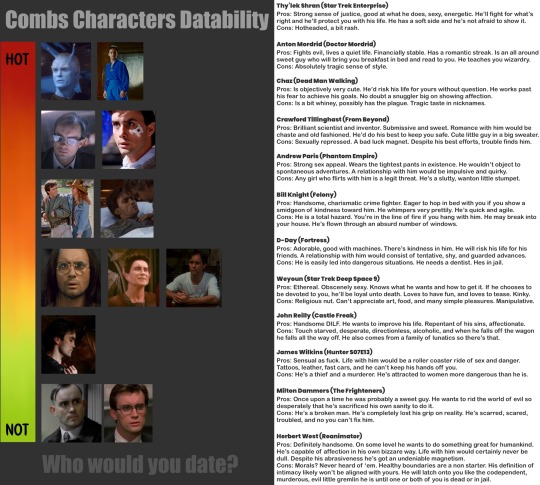
EDIT: Check out the newer version here, which has juicy new spicy content and two new characters (Harriman Gray and the Captain)
I saw something similar posted by @undeadgayboynes and was inspired to create my own. Which Combs character would you date?
Thy’lek Shran (Star Trek Enterprise)
Pros: Strong sense of justice, good at what he does, sexy, energetic. He’ll fight for what’s right and he’ll protect you with his life. He has a soft side and he’s not afraid to show it.
Cons: Hotheaded, a bit rash.
Anton Mordrid (Doctor Mordrid)
Pros: Fights evil, lives a quiet life. Financially stable. Has a romantic streak. Is an all around sweet guy who will bring you breakfast in bed and read to you. He teaches you wizardry.
Cons: Absolutely tragic sense of style.
Chaz (Dead Man Walking)
Pros: Is objectively very cute. He’d risk his life for yours without question. He works past his fear to achieve his goals. No doubt a snuggler big on showing affection.
Cons: Is a bit whiney, possibly has the plague. Tragic taste in nicknames.
Crawford Tillinghast (From Beyond)
Pros: Brilliant scientist and inventor. Submissive and sweet. Romance with him would be chaste and old fashioned. He’d do his best to keep you safe. Cute little guy in a big sweater.
Cons: Sexually repressed. A bad luck magnet. Despite his best efforts, trouble finds him.
Andrew Paris (Phantom Empire)
Pros: Strong sex appeal. Wears the tightest pants in existence. He wouldn’t object to spontaneous adventures. A relationship with him would be impulsive and quirky.
Cons: Any girl who flirts with him is a legit threat. He’s a slutty, wanton little strumpet.
Bill Knight (Felony)
Pros: Handsome, charismatic crime fighter. Eager to hop in bed with you if you show a smidgeon of kindness toward him. He whimpers very prettily. He’s quick and agile.
Cons: He is a total hazard. You’re in the line of fire if you hang with him. He may break into your house. He’s flown through an absurd number of windows.
D-Day (Fortress)
Pros: Adorable, good with machines. There’s kindness in him. He will risk his life for his friends. A relationship with him would consist of tentative, shy, and guarded advances.
Cons: He is easily led into dangerous situations. He needs a dentist. Hes in jail.
Weyoun (Star Trek Deep Space 9)
Pros: Ethereal. Obscenely sexy. Knows what he wants and how to get it. If he chooses to be devoted to you, he’ll be loyal unto death. Loves to have fun, and loves to tease. Kinky.
Cons: Religious nut. Can’t appreciate art, food, and many simple pleasures. Manipulative.
John Reilly (Castle Freak)
Pros: Handsome DILF. He wants to improve his life. Repentant of his sins, affectionate.
Cons: Touch starved, desperate, directionless, alcoholic, and when he falls off the wagon he falls all the way off. He also comes from a family of lunatics so there’s that.
James Wilkins (Hunter S07E13)
Pros: Sensual as fuck. Life with him would be a roller coaster ride of sex and danger. Tattoos, leather, fast cars, and he can’t keep his hands off you.
Cons: He’s a thief and a murderer. He’s attracted to women more dangerous than he is.
Milton Dammers (The Frighteners)
Pros: Once upon a time he was probably a sweet guy. He wants to rid the world of evil so desperately that he’s sacrificed his own sanity to do it.
Cons: He’s a broken man. He’s completely lost his grip on reality. He’s scarred, scared, troubled, and no you can’t fix him.
Herbert West (Reanimator)
Pros: Definitely handsome. On some level he wants to do something great for humankind. He’s capable of affection in his own bizzare way. Life with him would certainly never be dull. Despite his abrasiveness he’s got an undeniable magnetism.
Cons: Morals? Never heard of ‘em. Healthy boundaries are a non starter. His definition of intimacy likely won’t be aligned with yours. He will latch onto you like the codependent, murderous, evil little gremlin he is until one or both of you is dead or in jail.
#jeffrey combs#commander shran#thy'lek shran#shran#star trek enterprise#star trek#Anton Mordrid#doctor mordrid#chaz#dead man walking#crawford tillinghast#from beyond 1986#andrew paris#phantom empire 1988#bill knight#felony#d day#fortress 1992#weyoun#star trek ds9#ds9#john reilly#castle freak#James wilkins#hunter#milton dammers#the frighteners#herbert west#reanimator
99 notes
·
View notes
Text
Round 3: Poll 5
Propaganda under the cut
Pairing 1: Angstshipping (Ryou Bakura/Malik Ishtar)
Propaganda: Angst- trauma buddies, potential for healing narative. | I think they could have such an interesting dynamic considering they’d be the only ones who really understand what it’s like to have such a horrible experience with their respective yamis. It could open up some interesting character growth for Marik, helping him learn to move past the guilt from his mistakes by having Ryou assure him that he isn’t mad about what happened in battle city. They also would be able to understand eachother and bond over family tragedy, it’s not talked about much but Ryous mom and sister died at some point, and then there’s Marik who also had a mother die. They generally seem like they’d be really good at comforting and empathizing with eachother due to similar situations and circumstances, it’s cool seeing them grow and cope together in fan works. They’re also really aesthetically pleasing, literally sun and moon gays.
Pairing 2: Ateloshipping (Maxamillion Pegasus|Pegasus J. Crawford/Bandit Keith)
Propaganda: No propaganda submitted
Now, let’s keep things civil. This is a silly poll where we can share why we love our overlooked ships. There’s no need to be nasty to prove your point. Bashers will be banished to the Shadow Realm.
#ygo dm#ygo#yugioh dm#yugioh#yugioh dm rare pair poll#round 3#angstshipping#Ryou Bakura/Malik Ishtar#ateloshipping#Maxamillion Pegasus/Bandit Keith#Pegasus J Crawford/Bandit Keith
85 notes
·
View notes
Text
Jeffrey Combs characters datability tier list
With explanations; A to D, left to right
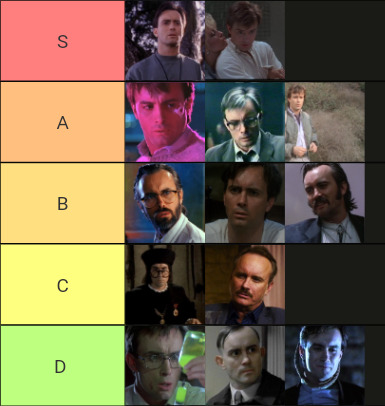
-Anton Mordrid
Pros: Literally the perfect man. Intelligent, honest, respects you, owns a bird. Communicative.
Cons: A landlord
-The guy from Cyclone (I don't care)
Pros: Very smart, respects your intelligence, will participate in your hobbies even if they don't align with his interests. Charismatic and flirty
Cons: Might die and leave you with the task of protecting a super weapon from the shadow government
-Crawford Tillingast
Pros: Earnest, hardworking, very sweet, intelligent. Will probably remember your birthday. Wears oversized sweaters you can steal
Cons: A pushover, really bad luck, probably not fully emotionally ready for a relationship
-Chaz
Pros: A dork and seemingly a wimp, but will actually surprisingly brave when necessary. Well dressed. Objectively very cute
Cons: Is named Chaz. Complains a good bit, kinda snippy. Infectious anxiety
-Andrew Paris
Pros: Fine as fuck yet highkey a dork, will tell you interesting facts about things. Does his best to be a gentleman
Cons: Kind of incompetent, impulsive. Won't set up boundaries with people trying to hit on him. Seems experienced, but I don't think he's ever touched a boob.
-Dr. Haggis
Pros: Strong morals and will do what he can to uphold them, able to keep a level head in difficult situations. Takes care of those around him. Respects you and takes what you say into serious consideration.
Cons: Lack of confidence, won't say what he means. Alcoholic and smoker with no sign of wanting to change, used as coping mechanism. Pessimistic
-John Riley
Pros: Puts on a brave face, optimistic, hard worker. Loves his family very deeply. Genuinely trying to fix his issues. Will make the right decision when push comes to shove.
Cons: Alcoholic in a way that endangers those around him. Wants conflict to resolve on its own, uncommunicative, will lie to you. When he slips, he slips hard. Has potential to be unfaithful
-Dinosaur Bob
Pros: Fun and carefree, will take you on the ride of your life. Cool mustache. Sees you as an equal
Cons: A bit TOO carefree, irresponsible and impulsive. Does a LOT of drugs and will probably try to get you to do them. Sociopathic and violent tendencies. No morals.
-Francisco
Pros: Confident. Will accept when he is genuinely wrong. Impartial party, focused on facts.
Cons: Literally no opinions of his own, will let awful things happen because an authority says it's fine. That haircut and those glasses. Extremely desensitized to violence. "Facts over feelings" motherfucker
-Shepard Lambrick
Pros: Sugar daddy, will buy you a lot of nice things and you'll definitely get in the will. Cool mustache. Doesn't let people disrespect you.
Cons: Sociopathic and violent tendencies, enjoys other's suffering. Manipulative. One percenter and proud of it. Pushes boundaries.
-Herbert West
Pros: Intelligent, passionate. Will give you gifts. Includes you in his hobbies. Does the 🥺 face
Cons: Will not listen to you nor respect your boundaries. Grand gestures instead of communication, love-bombing. Extremely jealous. Manipulative. Sociopathic and violent tendencies. Condescending, thinks he's better than everyone else, no respect for anything or anyone. Impulsive. Does the 🥺 face
-Milton Dammers
Pros: Passionate and hard working. Speaks his mind.
Cons: Will not listen to you, no ability to compromise. Probably smells bad, greasy hair. Aware of his faults and has no want to change. Obsessive. Probably into some weird shit
-John
Pros: Ridiculously hot, will rock your world. Will break rules with you, in a hot way. Makes you feel appreciated
Cons: Will suicide bait you, ridiculously manipulative. Will ghost you. Kisses a rat on the mouth. Your boundaries? Never heard of them. Will love bomb you and hold that above your head.
#jeffrey combs#herbert west#crawford tillinghast#the lurking fear#dr mordrid#reanimator#cyclone 1987#dead man walking 1987#milton dammers#the frighteners#evil clergyman#would you rather#shepard lambrick#love and a 45#dinosaur bob#andrew paris#the phantom empire#john riley#castle freak#This post is for no one#Looks at you with my autistic eyes
112 notes
·
View notes
Text
Texas Chain Saw Massacre Game lore Deep Dive!
I wanted to do a lore deep dive since I've been hyperfixated on this game for the past fortnight, so here we are. Also I have an Evil Dead the Game one coming out soon, but that's for later. Before we start, please note this game is a prequel to the first film, so Sally and her friends haven't met the Slaughter Family yet.
Essentially the main story of TCM (the Game) is that these group of friends go searching for Maria Flores, Ana's sister who has been missing for the past month. Since other crimes are happening throughout Texas, Maria's disappearance gets drowned out and the police are unable to help. Ana gets her close friends together, this being (so far) Connie Taylor, Leland McKinney, Sonny Williams and Julie Crawford, and she tries to find out what happened.
In their search, the group come across the Slaughter Family, and all of them are kidnapped and either held captive in the family house, the slaughterhouse, the gas station or Nancy's house. Through gameplay the player chooses their fates, and so far there is no canonical ending so it's unknown who exactly was kidnapped, where they were kept or who, if any, survived. (Update: There is now a canonical fate for each character, check the end.) During an opening cutscene, one of the 5 victims tries to escape but gets killed by Leatherface before everybody else even wakes up.
In gameplay only 3 members of the Slaughter Family actually appear, though Leatherface is mandatory and canonically is one of the killers hunting these group of friends. (Update: Leatherface is no longer mandatory to start a game, but considering the game was made with the intent of him being mandatory I'm still saying he's canonically one of the killers, it just makes sense.)
So what exactly happened to Maria? Well we have the prequel game "Petals" to answer us. Essentially, Maria had gone on a roadtrip where she stopped to take photos of random things that interested her, and every so often sent a postcard to her family to let them know she was safe. At some point, a man began to follow her around and she felt like he was stalking her every move even if she couldn't see him. In Newt, Muerto County, Texas, Maria's car broke down and she decided to kill time by taking photos. What she did not know was that Johnny was following her at this point, being the guy who had been stalking her. As she takes pictures, he follows her around before unlocking the front gate to the family house, leading to Maria entering out of curiosity. As Maria took her last photo, Johnny finally revealed himself and stole her camera. This caused Maria to realise who he was and flee towards the closest house, begging for help. Unfortunately for Maria, this was the home of the Slaughter Family and Sissy answered the door, and she and Johnny held Maria down as Leatherface killed the poor girl. After this, her body was taken to Black Nancy's house, where it's possible her friends found her (if that is where they spawned.) Since she had told her family about the man stalking her, and she'd stopped sending letters, her sister instantly became worried and began to search for answers, becoming paranoid after her car was found abandoned.
Whilst this is the main story, there are other behind the scenes lore related to the characters, mainly the killers. Since Leatherface, Cook and Hitchhiker are already well known I'll only talk about the new characters.
First, Sissy. Sissy is one of the original characters introduced for this game, however she was actually a scrapped concept from the original film that Kim Henkel removed, likely because the film was too crowded. (It should also be noted there is a member of the family named Sissy in the 2013 film.) Sissy is sister to the Cook, Hitchhiker and Leatherface, however at some point during her adolescence she ran away from home, and went around the country joining various different cults, most notably joining the Manson Cult where she learned the songs she sings in game. It's implied she wasn't always insane but became so after joining the Manson’s. During her time in the Manson Cult, she learnt how to make poisons from flowers and she used this on her victims as her MO. It's implied she was part of the cult during the murder of Sharon Tate, meaning she’s been in the cult for at least 4 years. Only recently she returned home to the Slaughter Family, where she quickly became a favourite of grandpa and a useful member of the team due to her innocent and sweet appearance. Sissy is seemingly the most beloved member of the family (aside from Grandpa) as Leatherface, Hitchhiker and Grandpa are on good terms with her, or at least as good as you’re getting in this family, with only Johnny and Nancy seeming to dislike her. As to why she isn't in the films, it's likely after the game she left the family again to either go off on her own or to join a new cult.
Next is Johnny, being based on real life serial killers who used their good looks to attract victims, especially women. Like Sissy, he was a scrapped concept that was reused for the game. He is not directly related to the Slaughter Family, as he is actually adopted and is only cousins to the main siblings. As a toddler, Johnny's real mother was murdered by Black Nancy, who for whatever reason, took Johnny in and raised him as her own, lying to him and saying she was his Aunt. Growing up he became sadistic and enjoyed using his charms and handsome face to attract his victims and kill them. Despite being good at killing, and excellent at drawing prey in, he is rather disliked by most of the family who find him too hard to control. Whilst the family are murderers, Johnny is a serial killer and causes trouble for the family by murdering girls all the time and drawing attention to them as reflected by the voice lines said in game. He got a scar on his left shoulder, from the "Pflugerville Incident" where he'd stabbed a girl to death, but her roommates woke up and fought back. Opposite to Sissy, majority of the family doesn't like Johnny, as Sissy, Hitchhiker, Cook and Leatherface all seem annoyed by him. Johnny is the one who inadvertantly starts the game, as it is he who stalks and eventually kills Maria, leading to Ana and her friends going after them, and this is one of the reasons the other family members are so mad at him, especially Cook who states he doesn't take pleasure in killing like the others do. It's likely he isn't in the films because he wasn't with the family, but rather with Nancy or off on his own.
Black Nancy is a black widow killer, using her meek and innocent apperance to draw in men, who she eventually married before they "mysteriously" disappeared. Unlike the other characters with an outside life, Nancy has a bad reputation giving her the nickname "Black Nancy" although nobody can prove she killed her husbands. In her backstory it's stated she didn't really kill her husbands for money, but rather because they couldn't fill the void in her heart, yet raising Johnny did. It's unknown what relation she has to the main family, but seeing as Johnny is considered a cousin to Sissy, Hitchhiker and Leatherface, it's likely she is their Aunt making her the sister to whoever their parents are (which might be Grandpa, idk lore's very weird.) Since she isn't part of their direct family, she isn't as close to the rest of them, however she is very much obsessive over her "son" in an odd juxtaposition as she is very motherly to Johnny, whilst also being sadistic and cannibalistic. It's likely she keeps Maria's body in her house to protect Johnny specifically. Since she isn't as close to the family and doesn't live with them, it's likely she didn't appear in the films because she was doing her own thing away from the rest of the family. She also seems to have a connection to Cook, but nothing has been confirmed. Some think she might be his partner, but considering she's a black widow, it would be weird. That and he could be her nephew so I'd hold off on shipping them.
Ana Flores is the unofficial protagonist of the game, being the one who gets all her friends together to go searching for her missing sister when the police were unable to do anything. Despite being a regular girl, she has the best endurance and takes hits easier, likely being due to her willpower. She is so determined to find her sister she literally tanks hits from a chainsaw, just to discover the truth. Likely following where her sisters car was found, she comes across the Slaughter Family along with 3 of her close friends, and they end up being kidnapped and hunted down in one of the four maps. It's unknown whether Ana or any of her friends survive, but considering the original film shows no signs the family were close to being caught, it's possible the victims were all killed, or Ana was unable to convince the cops of anything. It should be noted that Ana’s character is referred to as “The Final Girl” implying she might’ve survived. (Update: She doesn’t survive, check the end of this post.)
Finally there is Danny Gaines, Maria's boyfriend who went looking for her. He didn't go with Ana or her friends, he instead went off on his own and came to Black Nancy's house to find answers. Nancy knew what happened with Maria, and to protect her son she decided to try and kill Danny, which might've led to him being taken to the Family House which is right next to Nancy's house, being kidnapped alongside the others. Since his fate is not mentioned alongside the other survivors, it seems to be canon that he was killed by Nancy.
Some other small tidbits is that the Hitchhiker's camera is actually stolen from Maria, and is the same one he uses in the first TCM film. Majority if not all of the radio broadcasts are related to the Slaughter Family, such as a person getting poisoned by Sissy, the "Terror of 1-40", and Johnny's Pflugerville murder case.
Regarding canonicity, this game works with the original writers and actors, and nothing contradicts anything in the original 2 films, so I consider this canon to the franchise, as does the creators. If a new character comes out that is somebody like Sally Hardesty, that definitely won't be canon, but it is an online asymmetrical game, so not everything will be 100% canon.
These are really fun, but after Evil Dead the Game I don't think I'll do another since Friday the 13th didn't really have lore and Dead by Daylight has way too much lore for me to cover. As always, if you have any questions about the lore of this game, just ask, I don't have all the answers but I know most of the lore so don't be afraid to ask.
*UPDATE* The game devs have released an official lore post about the story! I’d recommend checking that out:
*SECOND UPDATE!! The Devs have revealed the canon fates of each character. Unfortunately every survivor dies in the game. First to die is Leland, then Sonny, Connie and Ana. Julie does escape the house but bleeds out and dies on the road. Personally IMO I think it’s odd they characterised Ana as the “Final Girl” just to have her not only die but not even be the last one standing? Like just say Julie is the final girl or make Ana the one who dies on the road… Since Danny is also dead, this means so far, nobody has canonically survived the Slaughter Family. I should mention, the opening cutscene where a victim is killed by Leatherface appears to canonically be Leland, since he's the first to die.
*ANOTHER UPDATE: An official lore stream has been uploaded that goes through each character in detail, so my post is obsolete and if you are interested you should just go check that out.
twitch
#lore#deep dive#tcm#texas chainsaw massacre#texas chainsaw massacre game#texas chain saw massacre#texas chain saw massacre game#tcm game#texas chainsaw game#fun facts
116 notes
·
View notes
Note
I saw a post you reblogged at some point about Fanny being stuck in a time loop and it got me thinking: if the main men (both protagonists and antagonists) of the different Austen novels time travelled back to the day they first met their love interest/the start of the novel - whichever is latest so wentworth, knightley, and Edmund Bertram would travel to the day the main events of their novels start - who do you think would end up changing the least of the events and the most (intentionally or not)?
Because I feel like Knightley would change the least and Henry Tilney and the three S&S gents would come next. But like Wentworth would immediately throw the entire novel off track and like Darcy and Henry Crawford would come in close second trying to change their truly awful first impressions
(Also I just want to add that I really love your Austen takes and discussions 😊)
Thank you!
This is a fascinating idea. Here are my thoughts:
Wentworth just marches into Uppercross Cottage and proposes again. Doesn't even wait to be properly introduced to the family. He's getting Anne back NOW. (She says yes, of course)
I can imagine Darcy having a tiny little crisis as he decides if he really wants to be married to Elizabeth, maybe he could just not accompany Bingley to Netherfield and his life could go the way he planned... nah, he can't resist. Off to Netherfield he goes and he lets Bingley introduce him to Elizabeth at the assembly ball. Things progress unimpeded and by Christmas there is a double wedding and Wickham's character is known throughout Hertfordshire. He skips town and Lydia is packed off to Pemberley to benefit from some better society. (Side note: Mrs. Bennet would push Mr. Collins on Mary if she had any inclination that Darcy liked Elizabeth).
If Bingley knew everything, he'd never leave Jane. He'd return from London and marry her, no matter what Darcy or his sisters said. (I wrote that once actually)
Does Wickham count as a main? Because I don't want him having the ability to predict the future. Yikes on bikes!
Henry Crawford is very interesting, because does he actually understand where he went wrong? I'm not sure he does. Can he resist a flirtation with two very pretty sisters? That would be a fun fan fiction to write. Because if he went for Fanny right off the bat and she knew nothing else about him... he'd probably succeed with her, secret Edmund love or not. And she certainly wouldn't have a leg to stand on in refusing his proposal.
Does Edmund come back in the same timeline as Henry? That would be so agnsty! If not, he'd probably be doing whatever he could to keep Maria and Henry apart, but he's shockingly ineffective in canon, so would he even be able to change anything?
Henry Tilney would probably just try to prevent Catherine being sent home alone. He could easily come back early.
Mr. Knightley's best move would be to tell Robert Martin to propose in person. I doubt Harriet could have resisted. Then he could just sit back and watch everything else play out.
Honestly, I don't know if Frank Churchill would change a thing, other than making sure his final letter was posted to Jane. He enjoyed the subterfuge.
Poor Edward Ferrars has to travel back while engaged to Lucy? I feel like he wouldn't even want to relive the novel, there is nothing he can do anyway.
Colonel Brandon would probably change a lot. He could immediately save Eliza and challenge Willoughby. He might even spare Marianne from a lot of pain.
Reginald de Courcy (Lady Susan) would likely act as well and save Frederica earlier than in the novel.
#question response#this was very fun!#thank you#austen heroes#jane austen#pride and prejudice#mansfield park#northanger abbey#sense and sensibility#emma#persuasion#lady susan
214 notes
·
View notes
Text
Mansfield Park - Henry Crawford and Fanny Price
I want to lay out how I see these characters and their relationship, because to me they seem to be set up as a deliberate contrast to Pride and Prejudice. At the tine of Henry’s first proposal, they are in a similar place to Elizabeth and Darcy at the time of Darcy’s first proposal, albeit with extremely different personalities than those characters: Fanny refuses him despite his wealth and her economic precarity because she cannot like or even respect him. However, Fanny, who is far shyer than Elizabeth, cannot lay out in direct and specific terms the foundation of her disapprobation of him.
From there, Henry sets out to win her regard in ways that very closely recall some of the events between Elizabeth and Darcy.
1) He does a great favour for a relative of hers. In his case, it is getting his uncle the admiral to have Fanny’s brother William promoted to lieutenant; in Darcy’s, it is saving the Bennets from disgrace by getting Wickham to marry Lydia. Darcy’s favour is far greater, and much more personally unpleasant for him, and he keeps it intentionally secret; he does it out of love of Elizabeth, but not to make her feel obligated. Henry’s takes only a few days of his time, its goal is get to Fanny to like him better, and he leverages it both at first and later to make her feel obliged to him.
2) He changes his manners to suit her. In Darcy’s case this means being polite rather than rude and haughty; in the case of Henry, who has always been charming and gregarious, it involves softening his manners to suit Fanny’s shy and quiet personality and engaging in more serious talk. In Darcy’s case this is a fundamental change in response to Elizabeth’s reproof; in Henry’s, it’s a simple adaptation to one person’s taste rather than another. He’s intelligent and able to engage in serious conversation when he wants to, but that’s not indicative of any fundamental change in his thinking.
3) He is polite to her family (the Prices, in Portsmouth) even when they are embarrassing.
4) He speaks with Fanny about reforms he is making on his estates to make sure his tenants are being treated fairly. These feels like a parallel to Elizabeth’s improved opinion of Darcy upon visiting Pemberley and hearing how well his servants speak of him. The difference is that Darcy has always been like that, whereas we are told early in Mansfield Park that Henry has been little on his estates during his adulthood: “To any thing like a permanence of abode, Henry Crawford had…a great dislike”. Darcy is acting in line with deep-seated principles; Henry is doing it as part of his courtship of Fanny, so he can bring it up to her and look good. He also tries to get her to counsel him to continue in this current vein, to engage her in a desire to fix/improve him, which Fanny shuts down laudably: “I advise! - you know very well what is right,” and when he reples that he always knows what is right when she tells him: “We all have a better guide in ourselves, if we would attend to it, than any other person could be.” The weakness of Henry’s motivation is seen in the ending, where he puts off a visit to his estates to set matters right there in order to flirt with the now-married Maria Rushworth.
In short, Darcy is already good in many concrete ways, and sincerely improves in the ways where he is faulty, not in order to get Elizabeth to love him but because he thinks about her criticisms, agrees with them, and wants to be better for its own sake; and he helps her family solely out of love for her and deliberately hides it. Henry changes his manner and talk as part of his courtship, but his deeper values and attitudes do not change, and everything is directed at getting Fanny to fall for him.
The second area of contrast is in what the heroines object to. Elizabeth’s aspersions on Darcy’s character, regarding his interactions with Wickham, are found to be mistaken; her legitimate objections are to his attitude and arrogance, and he amends this. Henry’s manners are impeccable and his company charming; Fanny’s objections are to his character. She sees him deliberately flirt with both her cousins at once to a degree that implies an intent to propose, and play them off against one another; she sees him make some very deliberate and mutually-understood innuendo towards Maria, signifying that she should break off her engagement and be with him instead, all with zero intention of actually proposing if she did do so; she sees him use the theatricals to continue this pursuit of Maria. And this is very usual behaviour for Henry; his sister says he has broken many hearts, and when he starts courting Fanny his goal is to make her fall in love with him and then leave her “feeling she will never be happy again”.
This is what makes me judge Henry much more harshly than his sister Mary. Mary can be selfish, but she is not malicious or cruel, and she can be kind when it doesn’t inconvenience her (and one of her better traits is that even when she is unhappy or disappointed she never takes it out on other people). In contrast, Henry’s principal diversion and entertainment for years has been deliberately making young women miserable, leading them on, getting them to reject other suitors in hopes of him, and then departing without a care, to please his own vanity. He is, in truth, doing not once but habitually, what Willoughby did to Marianne: always implying enough to seem on the edge of an engagement but never following through, and then pretending it was all nothing. It’s a casual cruelty he finds amusing as a proof of his skills. In short, he’s a deceptive playboy. Even after Maria is married, he can’t resist flirting with her, which is what leads to her disgrace and social destruction.
Even though Austen lays out an alternative scenario where Henry might have married Fanny if not for that final flirtation with Maria Rushworth, all of the above does not lead me to believe she find that scenario desirable. She’s painstakingly laid out all the contrasts with her previous novel that make this scenario a very different one from Pride and Prejudice.
In addition to Henry’s serial seductions, one of the biggest red flags is his attempt to make Fanny responsible for his character, with an attitude of ‘you’re such an angel, you can make me do whatever you want’. This gives me Tenant of Wildfell Hall vibes, where Helen’s aunt tries to warn her off thinking that an older man of the world will let himself be guided and led by a younger woman who is in his power. Fanny rejects this idea: Henry knows what is right, can make his own choice to do it, and she will not let herself be appropriated as his conscience. Henry isn’t debauched like Huntington, but if Fanny married him the chances of him feeling bored after some years - when he no longer has the thrill of the pursuit to keep him interested - and pursuing other flirtations and affairs to Fanny’s misery, seems pretty high based on his character; and he’s skilled enough at skirting the line that he could easily brush away any objections from her as “oh, it’s nothing, just being sociable.”
On top of all the faults of character - even if Henry did reform, I have trouble seeing Fanny and Henry being happy together. At the core of his personality is a need for change, for stimulus, for challenge (the latter, rather than sexual desire, is the main thing driving his string of conquests), and for company. Fanny, in contrast, very much prefers quiet and the company of a few people she is close to, and I think this is her genuine personality, not something that needs to be overcome by “bringing her out of her shell”. Henry would be bored to misery living the kind of lifestyle that Fanny is comfortable with, and Fanny would be deeply unhappy living in the social whirl and flurry of activity that Henry prefers. In contrast, Fanny and Edmund are both “me after a quiet day in: time for a quiet night in” people.
So, with all this, why is Henry/Fanny a popular AU? Apart from fannish dislike of Edmund (which I don’t share), I think part of it is that we don’t get an open confrontation between Fanny and Henry, the way we do between Elizabeth and Darcy, where she lays out her objections to him: I saw you flirting with both my cousins at once, I saw you making them both unhappy for your own amusement, I saw you repeatedly tempting Maria to break her engagement with no intention of following through if she did, just because you liked the challenge of winning an engaged woman. And the lack of this naturally raises the question of: how would Henry react if this confrontation happened? Which provides fertile soil for AUs.
188 notes
·
View notes
Text
one of the few good faith questions about s1 gender roles is why louis is only paralleled with white women. why does the show make him iolanta, melisande, nora helmer, etc and not claire kendry or janie crawford, characters who also appear in literature from the show's time period. why is he reading flaubert, colette, edward carpenter and not claude mckay or nella larsen who actually writes a lot about interractial relationships. on one hand the showrunner is white and maybe those are the texts he feels most comfortable with, but there are more than a few black creatives working on the show who are contributing in significant ways.
first of all, characters like iolanta, stella kowalski and nora helmer do not need to be white. they are white in their original forms because the writers were white and sometimes based them on real people. tenessee williams always wanted to have streetcar performed by diverse casts even though he based the characters partly on people in his own family. many productions now have non-white actresses in these roles (assad zaman was in one of these productions of a doll's house). also we can safely say lestat assigns melisande to louis because that's the kind of shit he's into (french opera based on a belgian story) and he's not really well read.
beyond that though, to me the reason louis is paralleled with white women is because he's married to a white man in 1910 louisiana where not only was interracial marriage illegal but homosexual relations and even interractial cohabitation were banned. but because of lestat's power, money and their vampire powers, these roles don't really apply to them. people who were in interracial or homosexual relationships in the 1910s had very different struggles and conflicts from loustat, like most of them could barely step outside without worrying about their safety. they certainly wouldn't be parading around society together all the time while even the politicians and authorities know about their relationship. so how do you make sense of your marriage if its very existence is anachronistic?? who's writing about your experiences if your experience is such an outlier in your society literally due to supernatural forces? there's no shortage of black literature in this time period (which overlaps with the harlem renaissance!) but being married to a white man is quite fundamentally different to being married to a non-white man especially in early 20th century. a white man has complete control over his dominion which includes the home and the outside world. a non-white man may have control over his home but the minute he steps out the door he's at the mercy of white men, he could be killed for simply looking at someone the wrong way, which makes non-white men impossible to relate to lestat. and who was allowed to be married to white men in those days? white women.
and ultimately louis is nora because the conflict of needing to escape an overbearing husband was something allowed only to white women in literature/theater. the reason we find so many parallels between louis and white female characters like belle even now is because his role in this story is largely reserved for white women and this has clearly ruffled a lot of feathers because its unfamiliar. i'll be curious to see what the show does as time moves forward but for season 1 it's very clear to me why the show chose these specific intertextual references.
#the loumand dynamic in s2 intrigues so much for this reason#cause we are moving into a lot more liberated territory#for louis who is so well read especially how does he relate his story to the stories he's read#iwtv
89 notes
·
View notes
Text
HI. BIG OVERVIEW OC POST THING. IT'S RAINFOREST FLOODS.
have you ever thought to yourself "hey wouldnt it be cool if there was an oc story made by two guys and it was about a haunted waterpark slash arcade in a fake town in a real state". you probably haven't. but if you have youre in luck! more under the cut ok.
rainforest floods is a terrible no good ocverse made by me and my good friend crawford @dykeseesgod. everyone in it sucks and is horrible except maybe one or two side characters. it's set in the podunk middle of nowhere town of timberline, new mexico, and more specifically a waterpark/arcade called rainforest floods (title drop).
also the waterpark SUUUCKS like its budget is nothing they are in debt. the managers havent paid taxes in 15 years. anyway these are the employees. theyre bad
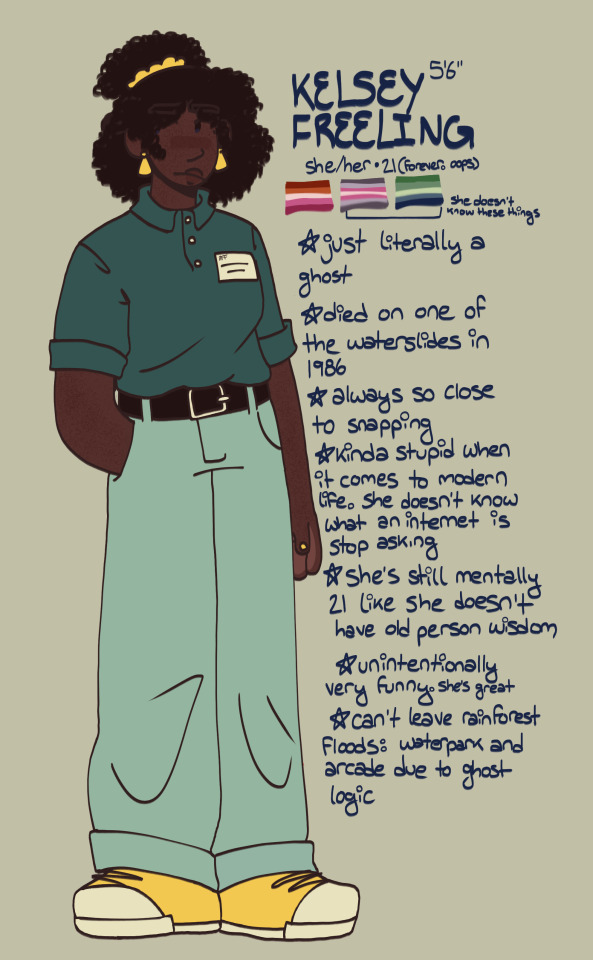
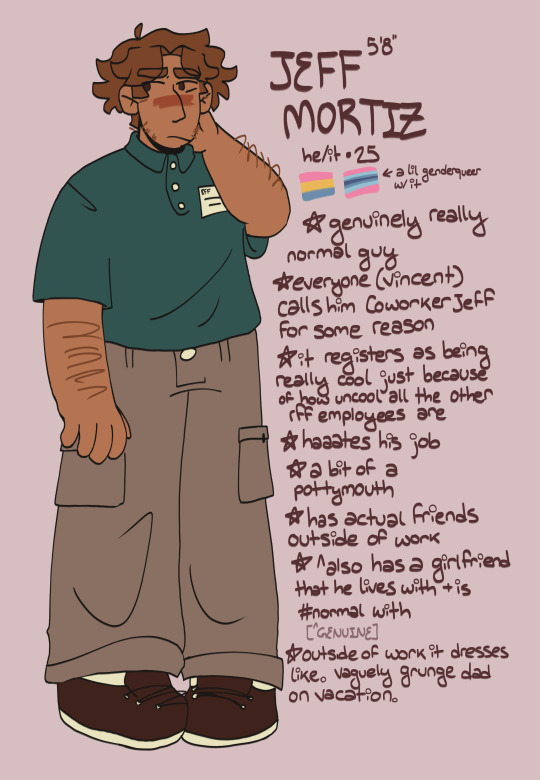

and these are the co-managers. theyre even worse (and also toxic old man yaoi. these refs were drawn by the aforementioned crawford)


anyway yeah. they get up to wacky hijinks in what will ideally be a tv show coming out in one million years. they're also horrible and tragic. most of it is bruce's fault. some of its not though!
ok also here's some other side characters.

^ running gag that nobody knows her name except kelsey who has a huge crush on her.

^ unnamed girl's younger brother who is constantly faced with horrors and torment at the hands of the rainforest floods employees. dont get me wrong hes annoying as fuck but he didnt deserve to run on that hamster wheel. (ref also drawn by ford)
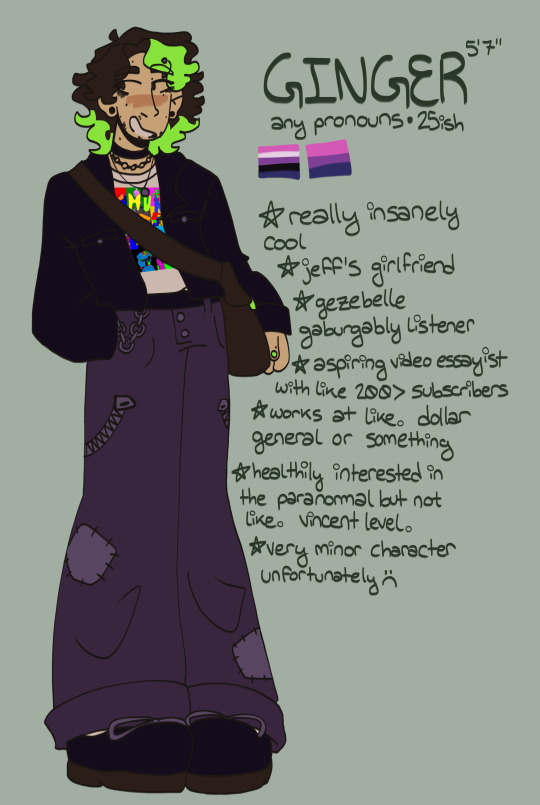
^ jeff's girlfriend. also the coolest person in timberline new mexico. worlds most unimportant minor character but she is wonderful and loved by the producers (me and cosmo)
FUNNY OUT OF CONTEXT THINGS THAT SHOULD MAKE YOU MORE INVESTED IN THIS OCVERSE
rainforest floods stupidity logic is a thing me and robbie came up with to explain why all the characters are idiots who dont find things out that are important to the plot too soon.
there's a chain gimmick restaurant that andy's whole family runs except him. its like italian food but its like also magicians. their tagline is "so good its practically magic". andy hates it.
kyle has a curse on him so that nobody remembers or recognizes him outside of like. his family. so the rff employees arent even targeting him for their shenanigans on purpose theyre all just weird freaks.
kelsey gives unnamed girl the company landline as her phone number because shes stupid and a ghost and doesnt have a phone.
the employees all get together on wednesdays in the breakroom and compare evidence on whether or not andy and bruce are together romantically. its the one thing that truly bonds them all together.
vincent: is a watchmojo fan, had his first kiss as beethoven in his 12th grade production of dog sees god confessions of a teenage blockhead (2004), gets really christian in some episode subplot, is not a swiftie but he is a gaylor, wishes he was jonathan sims sooooo bad, types like a toddler who was just given a keyboard.
vincent also ruined rainforest floods' lobby playlist
also there's a brand account that we run and post on whenever we feel like it. its more of a sounding board for ideas we may explore more in the future. its fun but it may be a bit difficult to get the full idea with the execution so :-( sorry you wont fully understand our wonderful and hilarious visions
annnd i think that's it. yay worlds silliest yet most tragic oc story. ok bye ^_^
30 notes
·
View notes